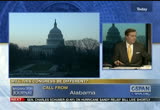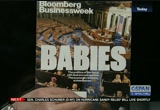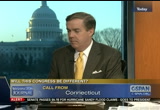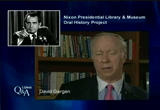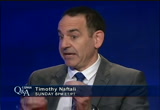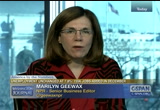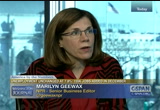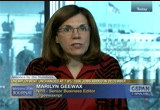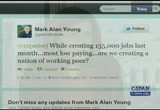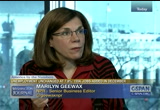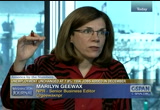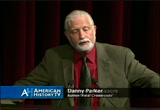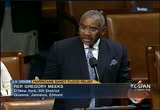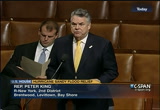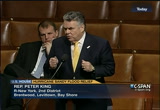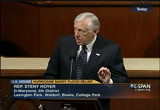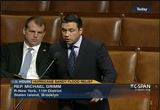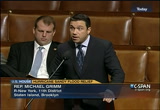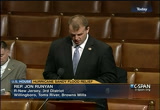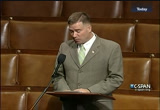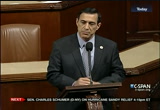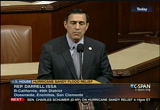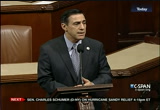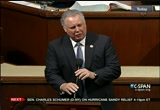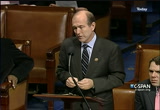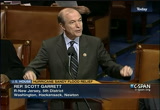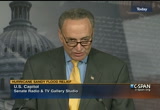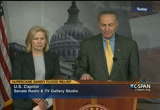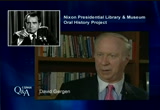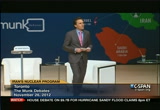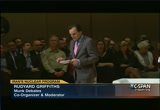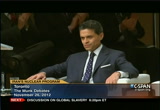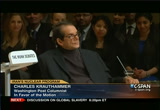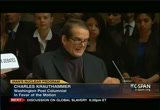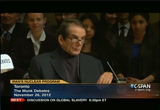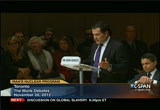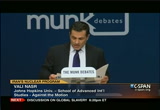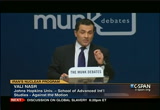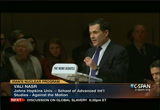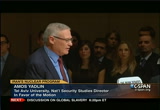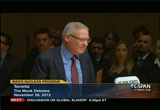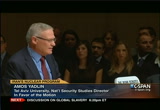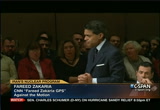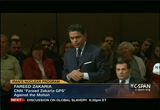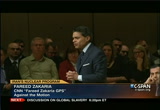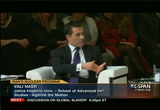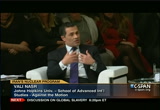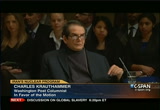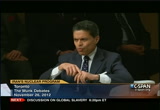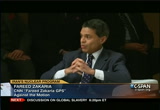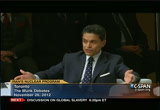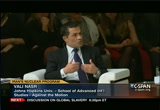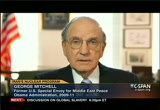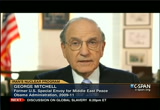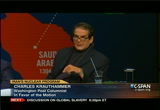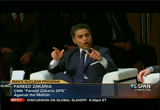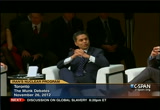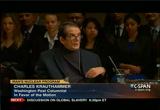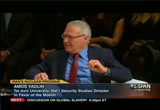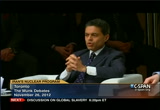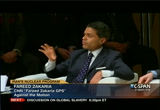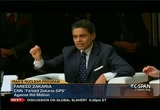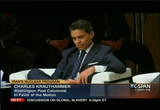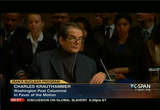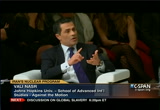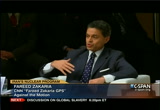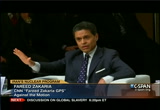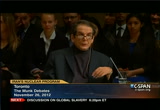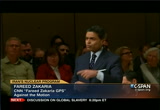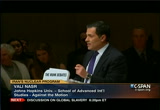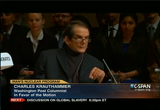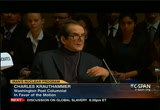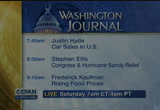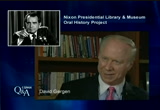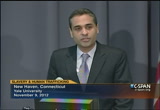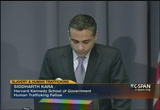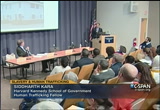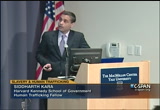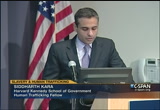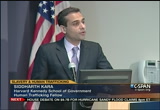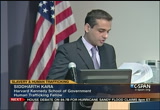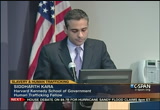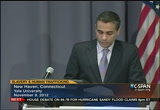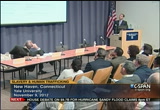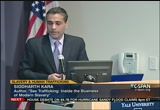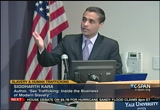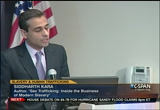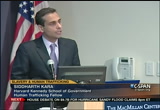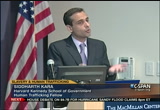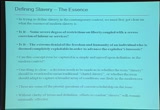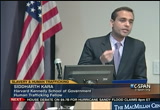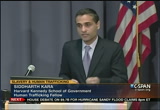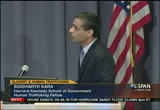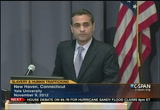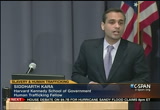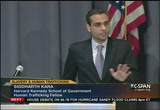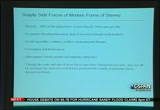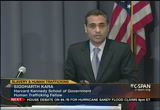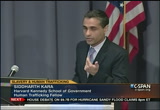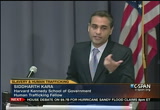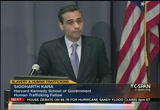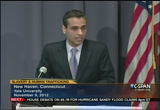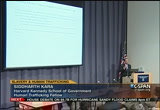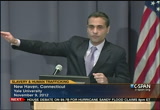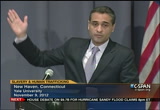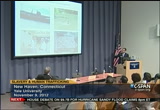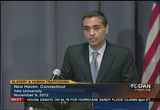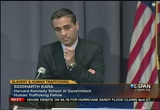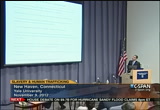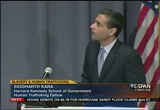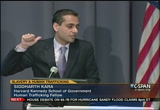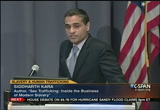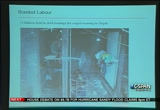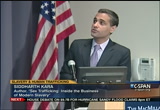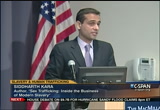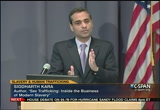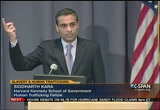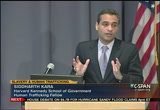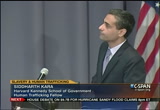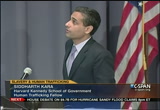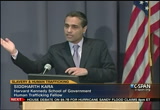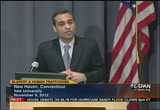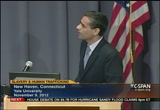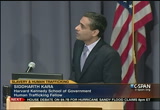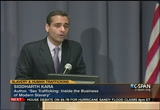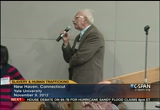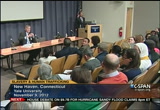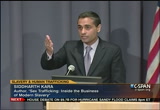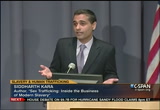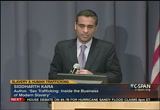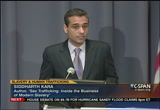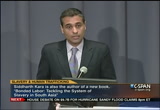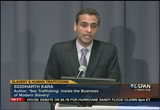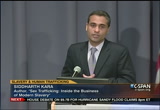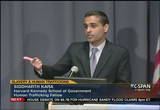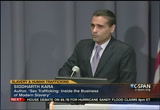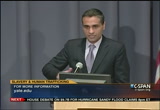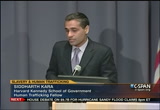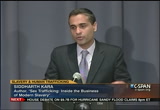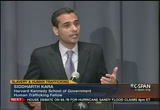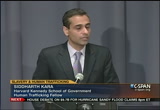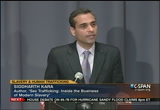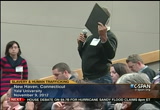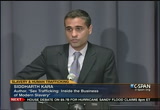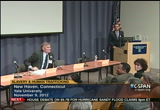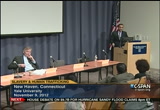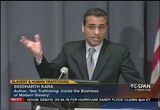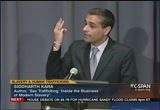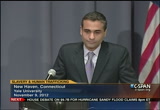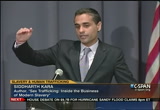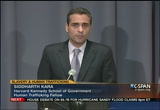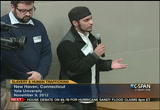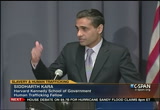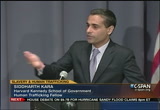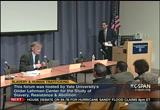tv Politics Public Policy Today CSPAN January 4, 2013 2:00pm-8:00pm EST
2:00 pm
2:01 pm
that is the opinion of eugene robinson. alabama on theom democrats' line. caller: i heard a congresswoman yesterday who said there was only to the blaze through the problem. he said one was raising taxes. the other, i cannot remember. i think the other was cutting programs. i feel like the only way they are going to fix it is by cutting programs or taxing businesses. i have looked at statistics. it said some corporations like exxon and walmart have more income. i do not understand how they do not owe more. we spend every day on these people. they are making millions and millions.
2:02 pm
it is amazing that they should not sit in on anything except to help the regulate everything. it is amazing to me. host: we are asking the question on our facebook page. will this congress be different? we welcome your comments. 78 are saying no. 17 are saying yes, it will be different. roman joins us on the line for republicans. caller: as far as will congress be different, i would like to say it will, but i have serious doubts. my main reason for calling is i have seen where you put up the top five most important things for the coming year. here it is funny the number one -- it did not even make the top five. that is our deficit. i do not know what people are thinking. >host: that was the first
2:03 pm
issue. this is what cbs news put down as the top five on the agenda. the first was the fiscal cliff and debt issues. caller: i did not see the debt limit. it ain't just the debt limit. it is the deficit. i do not understand why spending cuts were put off for two mounts. if this -- this country is going to go under if we do not make serious spending cuts. i know they can be made where they cannot hurt nobody. host: how would you do that? caller: i know they are in there. there is all kinds of stupid crap congress or somebody is paying for that they could get rid of. just like the nuclear thing. do we really need three of them? host: thanks, wilma.
2:04 pm
they listed five agenda items. let me share with you we have reached the current debt limit of $16.4 trillion. that will set the stage for another battle over spending issues. this is what it looks like. it was an issue mitch mcconnell said yesterday congress needs to deal with. [video clip] >> it will be up to the president and his party to work with us to deliver the same bipartisan resolution on spending we have achieved on taxes. it needs to happen before the 11th hour. for that to happen, the president needs to show up this time. the president claimed to want a balanced approach.
2:05 pm
2:06 pm
the next caller is from louisville, ohio. bob is on the independent line. caller: the guy was talking about walmart. the family is sitting on $250 billion. they do not pay any taxes. last month, 50 people got killed in india making 18 cents an hour. they got killed in a facility run by walmart. another thing about barack obama and extending unemployment benefits. he has had four years to redo tax and trade policy. he did not do that. he could have created jobs doing that. what he is doing with unemployment, he is becoming part of the new world order. that is handing people vouchers. host: another point of view from
2:08 pm
next is tyalor -- taylor joining us from chicago. caller: milli this congress is different from today? no. they have an issue with the president. the head of the tea party said she wanted to kick out everybody that voted for a tax increase on billionaires we know should play more. it is not about class. i wish i had money. i am not jealous of anybody. i think they could pay more. it will not hurt them. they will make more money. as far as extending unemployment, it can only go so far. three times, that is it. it is not like it is permanent. social security, i am going to be 62 in a couple of years. i would like to collect social security also.
2:09 pm
i cannot understand why they have this thing for this in the hurricane relief. -- this thing for the sandy hurricane relief. i almost fell out of my chair when i saw all the earmarks. excuse me? you expect me to pay $64 billion to go to connecticut and new jersey. $40 billion of it is earmarked. lop that off and give them the rest. i would like to know every member of congress that put those in there. i was so angry. host: you can watch it when the house dabbles -- gavels in in about 2.5 hours. this, from our twitter page. this is on our facebook page.
2:10 pm
we are watching the debate in the senate on the filibuster rule. there's a story available online at thehill.com. they say it should require them to hold the floor and debate if they want to block legislation. carl levin favors a more modest reform and has recruited republicans to negotiate a solution. junior democrats say unless lawmakers are required to sustain life floor debates, the chamber will remain. blocked most of the time. harry reid addressed that on the floor yesterday. [video clip] >> we have been occupied with other matters, including the
2:11 pm
fiscal cliff. i believe this matter warrants additional debate in the congress that just started. senators deserve additional notice before voting to change rules. it will preserve the right of all senators to propose changes to the rules and not acquiesce in the carrying over of the other rules. it is my intention that the senate will adjourn today. this important role in discussions to continue. i am confident we can come to an agreement to allow the senate to work more efficiently. host: this cover from bloomberg. a lot of attention on starbucks.
2:12 pm
it has spread nationwide. businessweek is taking aim at that. "i see no evidence the ceo's influenced anyone." the next call. caller: why are charges not being brought against harry reid for not following the constitution? he is supposed to bring the budget. he has not. he called john boehner a dictator. my other question is, dianne feinstein took an oath to the
2:13 pm
constitution for holding the constitution. yet she is for gun control and taking our rights away. we have the right to bear arms against a tyrannical government. why is this not getting out there? she is not upholding the constitution. host: from "the connecticut post." he replaces joe lieberman. there is this point cover story from the "new york post." a student on a bus heading to sandy hill elementary school, as the kids go back to school. from inside, "it is good to let
2:14 pm
the kids be kids." we will go to kelly on the republican line from montana. are you with us? caller: i am here. i am really concerned about the gridlock in congress. it is ridiculous. i do not think it will get much better. until we get a pile of fresh bodies, it will be the same gridlock. host: we go now to elena. thanks for waiting. caller: i want to say congress will not be different. you have the senate and president who are too far to the left. i feel john boehner needs to stand his ground and represent us on the other side. i feel in defense of walmart, it
2:15 pm
2:16 pm
there is this from mildred on the democrats' line. caller: i want to say one thing. it is not about whether this congress or the next do better. it is not about the president or the senate. it is about the american people have elected all of the officials to be our mouthpiece. we are divided in our election process. whoever wins, republican or democrat, the american people have done their job.
2:17 pm
now it is time for congress and our officials that we have put there to do their job and remember the oath they take when they come in to serve the american people. host: thanks for the call from connecticut. this is from the "washington post." nancy pelosi will guest star on the series finale of "30 rock" at the end of january. that is for the finale of the nbc program. they are notoriously tight- lipped about the upcoming episode. larry is joining us from biloxi, mississippi, on the independent line. caller: thank you for taking my call. i do not believe our congress or
2:18 pm
president are going to do anything different. they have laid out their lifestyles and the things they intend to do. they are looking for ways to decrease spending, but it seems to me we have elected some people to go into these positions to make our decisions for us. they seem to be self-serving. if you get an ineffective congressman who cannot do his job and has proven it by serving a couple of years and then gets voted out, that congressman still gets a pension for the rest of his life that is well over $100,000. we have thousands collecting this money. if you took a job and were expected to serve 20 years and do an effective job and could not do that, would you expect to get a pension for the rest of your life? why should we be paying these thousands of guys all this money? >> we go now live to the senate
2:19 pm
gallery for remarks from senator schumer on assistance to the victims of hurricane sandy. >> good afternoon. let me say a few things first. we're glad the house and senate acted and provided another $9.7 billion to the national flood insurance program. without this program, we would have run out of money leaving over 100,000 san the victims in the lurch -- sandy victims in the lurch. i would like to thank my colleagues on both sides of the aisle in the house and senate for making this an easy passage. we hope and pray the next bill will be similar. we do not expected to be the same. -- we do not expected to be the same. we are worried. it is good news the house passed the bill.
2:20 pm
we have visited people depending on flood insurance to help rebuild. flood insurance pays about $250,000 in limits. for most of the homes hurt industry, it pays either the bulk or completely for the damage. some of the destroyed homes will be worth more. that is good. the bad news is we have to go through this dog and pony show in the first place. last month, the senate passed a good bill to help all of the victims of hurricane sandy. the house could have taken it up and passed it. that is what it should have done. they promised to vote on a similar version before the last congress ended. unfortunately, this changed at the last moment. we do not need to get into why, but we do not want it to happen
2:21 pm
again. to be a bride left at the altar once is bad enough. to be left at the altar twice would be unconscionable. we need the house to move forward and pass the full $60 billion. we also need them not to put language in the bill that would make it more difficult for homeowners, small businesses, and localities to get the aid. we will have to examine their language carefully to make sure is not one step forward, two steps back. let me say this. the $9 billion is a good thing. there is no question about it. it is a good but small first step. the flood insurance relief is a small down payment on the much larger amount of aid we need to get through congress.
2:22 pm
the job has hardly begun. we must make sure passing this bill is not the end or even the middle. it is only a start. here is who has not helped in the bill. hundreds of thousands of homeowners who do not have flood insurance who lost their homes or suffered major damage. they cannot sign contracts for repairs until the contractor or the bank making a construction loan knows that there is money to reimburse them. right now, they know nothing of the sort. the money is not there. the cdbg account is dry. there is no money even with the passage of this measure for small businesses ready to go under, small businesses hanging on their fingernails because they have been out of business for three or four months.
2:23 pm
not only do they not have the wherewithal to repair their businesses, they have not had any income because their businesses are not functioning. we need health care. this does know ho -- this does not help to rebuild the shoreline so we are not naked to the next door. there is no money in this program for that. there is no help for all of the localities that have laid out billions of dollars. if they are not reimbursed as they always have been, taxes will skyrocket in the new york and new jersey area. this bill is a small first step, but it hardly gets at what we need. our governor has requested $80 billion. the administration approved $60.
2:24 pm
the senate passed the $60 billion. that was good news. that was a good, large step forward. we are waiting for the house. then we will have to get to work in the senate. the ideal senate -- situation would before the house to pass the same bill we passed in the senate. consentmost unanimous it on the floor. if they make changes, harry reid has promised it will be the first thing we take up when we get back. we will not rest until the full $60 billion is sent to new york and new jersey to provide the relief our homeowners and businesses need. >> thank you for your steadfast leadership fighting for the families in new york and new jersey are desperately need this money. it has been a tough holiday season in new york.
2:25 pm
families are wondering how we can begin to rebuild. so much of what is available does not cover everything. the much covers $30,000, a little more. -- fema covers $30,000, a little more. this flood insurance is vital for those who have the flood insurance. relatively few families have that. we need the rest of the money to begin to rebuild homes. we need the money for our roads and bridges and sewer systems and infrastructure. we need that money to flow for the cities to rebuild. we need to make sure businesses have the money to begin to rebuild what has been lost. that is what the families are waiting for. they look to us in washington to come together and get the work done. can we find the common values to offer some amount of help at a time it is so desperately needed? i was very grateful to house
2:26 pm
passed the first $9 billion. it makes a difference. we were able to do it unanimously. but this is just a small first step in the direction of meeting the real needs. new york has always stood by every other region of the country when they have undergone natural disasters. this is a moment when we desperately need other states, senators, and members of the house to stand by new yorkers. it is a time of great need. families are still not in their homes. children are not in their schools. we want to make sure they can rebuild their homes and be back in their communities. that is what we need this money for. i am eager to work hard on the next package. we need to have a package out of the house that mirrors what we passed in the senate. we will work night and day to make sure the needs are being met. >> we are ready for your questions.
2:27 pm
>> on your concerns about what is in the house bill, can you talk about that specifically? >> we want to work with them. there are some provisions that are different from the senate bill and make it harder for funding. there are others as well. those are the two that stand out. >> there are relatively small amounts of money in the senate bill that caused controversy. why is it important to keep those in? >> we have had a tradition of dealing with disasters that have not been paid for. there are parts of irene that have not been paid for. there are parts of the tornadoes in missouri that have not been paid for. we have done what the senate has traditionally done. the house has moved to take out some of those. we will see what happens.
2:28 pm
the bottom line is none of this is extraneous to disasters. if the house wants to take it out, we will have to deal with that in the senate. it will make some people not happy. it may make it harder to pass. we've gotten the support from our senate members on both sides of the aisle to help the people of hurricane sandy that i think we could overcome it. >> some of the language was opening up vehicles for other states to play -- to apply for money. allowing other states to apply for that fema money. that is what makes a difference. we have not had an opportunity to give relief to other states. to broaden what we ask for allows others to make applications to the federal government. that was a sense of fairness. >> there are some that use
2:29 pm
things as excuses. some people have said there is pork in this bill. there are no non-disaster related things in the bill. omb scrub it to make sure that does not happen. there are some that say we should not do mitigation. that is why they do not want to vote for the bill. we have always done litigation when it comes to disaster. it makes no sense to rebuild a building in a flood plain the same way. we cannot tell people to move a mile up the hill. we are too densely populated. if you tell a lot of our localities they have to pay 35% of the damage, they will never rebuild. the same thing with homeowners and small businesses that have lost everything. i think a lot of people -- i think there has generally been good will on both sides of the
2:30 pm
aisle and in both houses to help us. there are some values things as excuses. -- there are some that will use things as excuses. we have started doing it in the hopes to get the best bill the house and senate can pass as quickly as possible. >> the you have any thoughts about paul ryan voting against this? a >> flood insurance is an obligation of the federal government. they pay hundreds of thousands of dollars a year, and the government says if you are flooded we will reimburse you. i do not understand why anyone would not want to vote for that. i have not heard congressman ryan's reasoning. [indiscernible]
2:31 pm
that is terribly harsh to a homeowner who has lost their home. should they sit around and wait for two years until we reform the program? there is nothing wrong with reforming the program. we have made efforts to do that. the homeowners who does britney need this money and had paid in for this monday, as hostage to reform? that is unconscionable, wald. i would hope congressman ryan would reconsider. >> why are you still working to get the other billions out? it was your understanding? >> there was a huge problem with speaker boehner pilling -- pulling the bill. now there is a much better attitude on both sides.
2:32 pm
it was always good on the democratic side. we will have to work things out in the next few days to see if that can create the kind of bill we need. >> and there seems to be a renewed commitment. this is something we will come together to do. >> we are -- i am -- we are more optimistic today because i think that people realize that pleading games with this money was broadly unpopular in every part of the country and with every political stripe. >> i want to switch gears for a minute -- and not let's stay with sandy. >> the you agree with republicans that said the program needs to be privatized? >> i am not for privatization
2:33 pm
of flood insurance. there are not enough insurers who would ensure homes at rates that any person could afford. it did not come from a big push from the northeast. the flood insurance came from a big push from florida and the carolinas and the gulf states. the reason there is flood insurance is the private sector would not handle it. >> the you have any idea -- and do you have any idea in terms of claims and time? >> fema will be pretty quick. over $3 billion has been the shifter did already to individuals and governments. not in terms of the amount of damage, but fema has been quick in its distribution. the law limits what it can do. i was in long beach, a community
2:34 pm
of 35,000 people, and the average home experienced more than $100,000 of damage. if you lost your bottom floor, electric system, boiler, it is hard to rebuild that home and make a better without mitigation 900.$31,000 the money that would go to homeowners and business, they do not have any money. they're covered is bare. >> does that affect your plans for pursuing a tax relief bill? >> no, we have always had a tax relief bills after major storms. irene, a similar one we put in with sandy, that still has not passed.
2:35 pm
that still is part of the next tax measure. we can now go to the subject. >> can you talk about your plans for gun-control background checks? >> several of us are working with vice-president biden on some reasonable measures. we want to preserve the constitution, the second amendment, but we want to protect our families. there are reasonable reforms, and limiting the military-style .eapons, limiting the rounds o common-sense reforms, we do not have a set of laws that prevent people from bringing weapons from one state to another state. it is a huge problem in our
2:36 pm
state, and those are the kinds of things we can work together, also on mental-health issues. i'm hopeful with senator schumer's leadership we can come together and create a reasonable agenda. >> there are a lot of senators about what proposals to pursue. many are related to guns, mental illness, of violence, the general violence in video games, television, and our society. we're working with the white house. we have been talking among members, and you will see a package of proposals emerging when we come back into session. >> are talking about gun shows? >> we all have our own views. senator gillibrand and i have introduced specifics bills on these issues, but it is
2:37 pm
important together and figure out the right package. it will be something that i think deals with the problem, but is respectful of second- amendment rights. that is the only way to go. >> there were concerns raised on the house floor when the senate could get to this bill, because you have a filibuster or form. >> leader reid said it will be the first order of business, and it is my hope we get the whole thing down on the president's desk by the end of this month. >> are on the finance committee. what proposal do you favre to raise revenue to tax reform for deficit reduction? >> just passed a major bill.
2:38 pm
we will discuss the various things available. >> which of the proposed filibuster performs would you support? >> we have to do something. the senate is broken. if we cannot come to a bipartisan agreement, we have to get 51 votes for some kind of change. that is easier said than done. we are measuring. i think there is a consensus on the democratic side we have to do something. i would like to go as far as we can with something that passes, and that is what we are trying to work on. i believe we need real change. >> this is the last one. your response to senator cornyn 's op-ed? >> i have not read my copy of "the houston chronicle" yet.
2:39 pm
i think risking government shut down, risking not raising the debt ceiling, is playing with fire, and it is my strong recommendation to my caucus, to the house democratic caucus, and to the president that we make it clear, not in the middle of february, but from next week on that we are not on to do that. if anyone wants to come in and negotiate and says we will do this only -- we will raise the debt ceiling only if you do a, b, c, will not have a good negotiating partner. i would bet that they not go forward with that. if they are convinced -- those who want to use the debt ceiling as a tool to bring change that they want, if they realize for sure that they are not on to have a negotiating partner, they will have to find
2:40 pm
another route to bring their change. the only way they get leverage is when they think we might negotiate on this issues. it is very sad 2011 when that happened, and i think there's a strong consensus not to repeat what i would call, what most of us would regard, as a mistake. ok, thank you, everybody. [captions copyright national cable satellite corp. 2013] [captioning performed by national captioning institute] >> the senate earlier approved the first segment of sandy aid. the second part of the package will be considered by the senate when they return from their break. we will bring you live coverage
2:41 pm
of the senate and house on the c-span that marks. we have complete coverage of the hurricane sandy a debate available on the c-span video library. there are briefings, statements, and debate all available at c-span.org. >> the big discussion i remember was what is richard nixon going to do? i remember going home at night, you are scared to death. this thing gets out in the press, it is a disaster for all of us. >> johnny came to me and said, john dean the president's council, has brought me a list of 50 names of people and wants a full investigation of then. that is a very unpleasant thing to have happened to you. >> shortly after the farewell e, and, al haig called mea he said, we have about one
2:42 pm
thing. we forgot a resignation letter. i said, that is very interesting. it will be interesting reading. he said, you do not get it, you need to write it. >> dressed in a was for the players, key people living from that era to tell the story themselves. i thought the best way to do this was to start a video oral history program that involves the nixon players, but also players in the watergate drama on the left and right, to have them tell the story, and then to use portions of that story in the museum to let visitors understand the complexity of this constitutional drama. >> the former head of the nixon presidential library details the brary's oral history project. sunday night.
2:43 pm
>> i like to watch c-span because i can get the news about the contrast, also the debates and the election and news coverage. i like c-span programming because it is clear, direct, and it is not to seem to be colored by points of view. i want to get a good, clean, filtered -- unfiltered information about the war, i watched c-span. >> david maxwell watches c-span. >> the labor department released the latest jobs numbers earlier this morning showing the unemployment rate was steady at 7.8%. we talked about i t shortly after the report came out. >> on fridays, we look at
2:44 pm
america by the numbers. we want to look at the latest unemployment rate, which has remained unchanged, 7.8%. guest: the economy has enough underlying momentum that it was able to withstand the fiscal cliff, all this controversy in washington, as well as hurricane sandy. there was some pretty big- weights on the economy, and yet is still continued -- to churn ahead. every month, we have created on average 153,000 jobs. host: in a country with well over 3 million americans, they're more than 12,000,002 are currently out of work. almost 5 million long-term unemployed.
2:45 pm
the discouraged worker, about 1.1 million. guest: it is good that the economy kept churning along, but it is bad the we have such a lousy economy. we need to create something like 350,000 jobs to get unemployment down to 6%. we're falling short every single month. it is a recovery. we were in such a deep hole that it has been really difficult to dig out of this hole. if you're looking and reasons for optimism, you can look at this and say, good. if you're one of those 12 million people who does not have a job, this is a disappointing report because it is not stronger. it is not enough to start to mockup all the jobs were lost. host: if you are unemployed or underemployed, call us at 202-
2:46 pm
585-3882. for those of you who are unemployed, we're dividing our phone lines regionally. you can send us an e-mail or join us on our facebook page or twitter.com/cspanwj. when do you think you'll get to the point that we're creating these 300,000 or 400,000 jobs? guest: there is a pretty consistent story here. health care is good. as the affordable health care act kicks in, there will be more people with insurance. there is good reason to believe that we will see continued growth in health care jobs.
2:47 pm
well that is great, health care jobs is not an engine of growth the way that manufacturing jobs would be. what you're looking for is when we will have that turnaround when construction really comes back, manufacturing really comes back. you have seen some hints of that. there are numbers in here that are somewhat encouraging. new home construction is up. this report shows that building construction is up. autos have been great in 2012. when the year began in january of 2012, the average age of a car on the road was nearly 11 years old. there were a lot of people out there who really needed to get a new car. maybe those manufacturing jobs will continue to grow.
2:48 pm
aerospace, if we can get the sequestration settled and figured out, we should be able to see more jobs in those kinds of industries. there is a reason for hope for 2013. honestly, if congress continues to push the political crises where we go into another debt ceiling crisis, it is possible it could still be derailed. if there is not a giant political crisis, there should be good reason to think that jobs will pick up in 2013. host: marilyn geewax, sr. business editor for npr. our line for unemployed. caller: do you think that allowing companies -- i know
2:49 pm
the government cannot do much in a way of drafting policy or legislation that prevents companies from using a background checks and credit history do not hire people -- i will be honest with you. in our current situation, maybe doing something in the way of incentivizing companies to hire people with these histories, wouldn't that help to bring these unemployment numbers up? guest: you have touched on a big issue here. there are a lot of people -- we
2:50 pm
have got 3.6 million job openings right now. there are lots of jobs that could be filled, if people have the right training or the right resumes. let's say that your credit history is bad. that works against you. they cannot get into these millions of open jobs because of things that happened in the past. how do we get these workers trained, and how to get employers to be open to hiring them. there are a lot of economists who are saying it is a problem of technology. they're all these software programs that scan through resumes and if they see some and they do not like, they throw it out and do not give you a chance. employers need to stop with the
2:51 pm
automatically running every resonators and software and say, that is bad, that is bad. go back through the pile and take a closer look. call the person in. is their credit score damaged for a good reason? there are many economists who are concerned about this issue of mismatch between what employers want, and what the available work force actually is, and how to get those two to match up better. it is a challenge for business. i am not so sure there is any specific thing government could do about that. but many business groups, chambers of commerce could encourage employers to be more reasonable when looking at applicants. host: you can also join us on
2:52 pm
twitter, #abtn. on our line for unemployed workers. how long have you been out of work? caller: three years. host: what did you do? caller: aircraft mechanic. host: what have you been doing since then? caller: nothing. out of this 150,000 some odd jobs and has been created, how many of those are 40 hours a week with full benefits? host: in your job search, have you found any of those jobs? caller: no. host: how much did you make before you got laid off? caller: $38 an hour. host: have you been getting unemployment benefits? caller: barely surviving. unemployment benefits.
2:53 pm
guest: they are really pointing out key issues on these calls. so many of the jobs that are being traded are low wage. when you look at what was created this year, food services. there were more people with more money to spend because unemployment got a little bit better. so that went out to eat. there were more vacations taken this year, more dining experiences. talkingour, you're about jobs at amusement parks and hospitality, restaurants, bars. those are jobs that tend to not have benefits, tend to not have 40 or schedules, or lousy hours, working in the evening. it is not a $38 an hour job. that is where we're seeing this
2:54 pm
-- on the one and you have these low-paying jobs in restaurants, nurse's aides and things like that the to not pay a whole lot. and then you have job openings for doctors, very high pay. engineers, accountants. but it is the metal workers, the people who make $20 to $40 an hour, those are the people who have had a hard time regenerating. not enough in the middle. host: the bureau of labor statistics, digging further into the numbers, we can show you some of the findings. mining and logging,
2:55 pm
transportation and warehousing, financial activities, as well as professional and business services. also the area of the government. host: big government layoffs happened about two years ago. government is still continuing to shrink. overall, it is not a growth sector in terms of jobs. the giant layoffs in a lot of industries, we're not seeing them. i asked someone who tracks unemployment about layoffs. he said, we have not seen massive layoffs -- remember back in 2008 and 2009, tens of thousands of people would get laid off every day.
2:56 pm
and now if you do have a job, you are fairly secure. he was saying that when he looks through the data they collect, they are not seeing these kinds of mass firings and insecurity for workers that we saw. host: people are keeping their jobs on average 5 1/2 years. guest: we're also not in a big hiring mode. host: will businesses resort to part-time workers as a result of the "obamacare" rules being too costly? from rightwing. guest: it is to be expected that we will see more people renting, more job mobility, more employees will be less
2:57 pm
committed to staying in one place for a long time. they want to keep getting raises. people will stay mobil and look for new opportunities. from a business point of view, you may not want to commit to a worker. you may think, we do not know where we are going with obamacare. let me have part-time workers and see how the recovery plays out. on both ends, the employer and employee, there may be more validity than what we used to have reviewed by house, get a job, and stay in it until the retired. host: the senior business editor for npr is our guest. when is joining us. caller: i like to discuss trickle-down economics. you see how the democrats and republicans, they always are at
2:58 pm
odds with each other. how are they going to be able to create jobs if they are not getting along now? guest: well, it is a new congress. we have to try to be optimistic until proven otherwise. we have a new congress that just took office yesterday. the 113th can start with a fresh slate. maybe the have learned some lessons from what happened in this whole big mess during december with the fiscal cliff debate. one can only hope that they realize that is not a great way to go forward. maybe they will work with coming up with solutions to some of the spending problems in a more orderly fashion. we will have to see how it plays out. host: the unemployed rate in the country unchanged, 7.8%.
2:59 pm
the economy adding 155,000 jobs in december. ron is joining us from washington state, out of work. how long have you been unemployed? caller: 3 weeks. i was a supervisor at a small remanufacturing mill for 37 years. i am 57. host: what is your strategy? caller: my game plan is to try to get into the trucking industry. it appears for my age and experience i have but that is the best way for me to try to get to retirement age and still earn somewhat of a decent living. host: thanks for sharing your story. guest: am sorry about your job
3:00 pm
loss. that is a very tough situation to be in. the trucking industry has been hiring people. i have heard of $60,000 a year jobs that are going begging because they cannot get people to work as truckers. hiring welders, pipe fitters, people with skill and willingness to move to where the job is. it is tough at 57 to yank your life up, but there are opportunities if you are able or willing to make some moves. in north dakota, the unemployment rate has been running around 3.1%. they're desperate for workers, truckers, people who can contribute to where the energy
3:01 pm
industry is right now. things like what you are talking about here, to have to pick yourself up and start over again -- 57 can feel pretty old. on the other hand, you have got 10 more years of working life ahead of you before you can get your full social security benefits. youve got to not given, if -- give in, if you can help it, and try to find the energy and commitment to start over again. there are jobs out there, but it is not easy to change. host: one of our viewer saying, with weak demand in a number of key sectors, what is happening with the retraining effort? guest: that is something congress will have to work out again.
3:02 pm
that tends to be on the spending side. i think that the community colleges in this country are really trying hard to pick up some of the slack and work with businesses to come up with training programs. the one thing that everyone has learned some lessons about is the nonsensical student loans, taking out a bunch of student loans, going to community college and never finishing or never getting a degree or taking classes that do not lead to a job. congress will probably try to consolidate and rationalize federal funding for job training programs. students have learned some hard lessons about, to not just take out loans without really thinking it through. make sure that what you are studying actually leads to employment. host: you're talking to those of you who are out of work as well, including daniel in kansas.
3:03 pm
please go ahead. caller: i work at a meat packing factory back in 2009. they laid a bunch of us off. i have had medical problems before then. i went ahead and work. -- worked. i was offered a job at walmart. the credit bureau did a credit check. they told me to comment, be ready for work. i showed up, they told me my credit score was not high enough. now i am even fighting for disability. there is no jobs here in kansas. guest: this is why we have 12
3:04 pm
million people unemployed. between physical, medical problems -- that recession of 2008 and 2009 brought so many people not only out of their jobs, but out of their medical insurance. problems that people had, even things like dental problems, all sorts of physical difficulties of people did not have insurance or money to take care of and five years later, we often look at these numbers -- it is not that they are sitting at home, eating popcorn and watching television. a lot of people cannot get back into the workforce because of these kinds of reasons. medical problems, bills of piled up because of the recession and they hurt their credit scores. you have a backlog of problems that of shoved a lot of people to the sidelines.
3:05 pm
this comes back to that point where if job creation picks up enough, maybe employers will stop looking for that perfect employee and go back through those resumes and say, maybe he does not have a perfect credit score, but work with him. these credit scores are so readily available now that it is tough to get past the problems you had for five years ago. host: scott is on the air with marilyn geewax of national public radio. caller: i am curious why none of the commentators are ignoring the great growth in productivity in this country.
3:06 pm
the fact that in the last 15 years, a third of the people are no longer needed her to raise the foodstuff to raise a family. everyone seems to be ignoring the effects of robots and computers. that is a big difference between this unemployment era and previous ones. the jobs are not coming back. there is not as many people needed to produce the cars, the foodstuffs, and everything else, as there was 50 years ago. more and more of the bulk of the country is being generated by capital equipment instead of manual labor. guest: productivity has dramatically increased.
3:07 pm
i have a little tablet with me here. the technology is at my fingertips, that is where i would go to a librarian -- who would have a job -- and ask, can you help me find this? this makes it easier for me to be a productive journalist. on the other hand, it does take away jobs. the theory of that is that as workers become more productive, they should generate far more profits for their bosses. they should get bigger raises, and they should be able to buy bigger homes, which causes are to be in need for construction workers and landscapers and furniture makers. there should be gains to the
3:08 pm
economy in general when workers become more productive. the problem is that both productivity gains have come -- and not the same proportion of the gains from that have gone to workers. a lot of the gains have been in the form of higher corporate earnings. it has not yet really filtered out into the average person. that is something that everybody is watching. is it a matter of time until these productivity gains start to trickle down? does it start to infuse the economy with lots more life, or not? right now we're waiting to see, what do all these massive productivity gains mean for the overall standard of living? host: to our radio audience,
3:09 pm
we're looking at the latest unemployment rates. the figure for the month of december, 7.8%. our guest is marilyn geewax of national public radio. mary says on twitter, if you happen to socialize in the right circles, you can get that job. gregg is out of work, joining us from bradenton, florida. caller: my credit is not that good. but i do not understand what your credit has to do with getting a job. you put everything on the internet. i have been unemployed for a year. i have even owned my own business at one time. i do not understand why
3:10 pm
somebody would not hire you because you have bad credit. host: what about point from mary, who says it is about who you know? caller: i am working on that. i may be getting employed by the end of this month, doing something i really do not know what to do, but it is a job. host: thanks for the call. guest: this idea -- call it trendy networking. this idea that people would rather hire someone that they know, networking? if you talk to anybody --
3:11 pm
networking, if you talk to anybody, they all say the same thing. go around and talk to people in person call on your friends. ask around. if you know somebody, tried to reach out to that person to help get you in front of a potential employer instead of filling out a form on line. host: a comment, while we have created 155,000 jobs, most are low-paying. guest: actually, lots of good jobs are being created. the jobs that going begging right now, the ones the require
3:12 pm
a lot of education and specialization, those tend to be going begging. there are opportunities there. it takes a lot of schooling and effort to get yourself where you're in position to take those jobs. if you want to be a waitress, you can probably find a job. if you want to be a brain surgeon, you can probably find a job. if you want to be an aircraft mechanic making $38 an hour, that can be a lot tougher. there is one thing that is helping with that, this energy resurgence. we're seeing an awful lot of energy jobs being created
3:13 pm
because of this process the people referred to as fracking. and unconventional means of extracting oil and gas. another area that is doing pretty well is spinoffs from agriculture. if we have a somewhat normal year in terms of weather this year, the agriculture sector. there are some points of hope within that structure. it is generally true that low- paying jobs and high-paying jobs are where the action is right now. host: marlin is joining us from illinois.
3:14 pm
caller: i have been out of work. i am constantly hearing, they're not hiring skilled people. i went back and earned a master's degree in computer science and mathematics. i am still unable to get an appropriate position. host: what have you been doing? caller: i have been adjunct teaching and tutoring in math. it is part time, and there are no benefits. guest: probably the best thing in a case like that is to keep doing those kinds of part-time jobs. a lot of times, things start out as internships or adjunct.
3:15 pm
those things can help create those networks that lead to jobs. the overall jobs picture is not great. we have 12 million people looking for work right now. the unemployment rate is still 7.8%. that is very high by historical standards. it peaked in october of 2009 at 10%. 2009 is an awful long time ago. that is a tough job market. it is a hard time still for an awful lot of people. host: one of our viewers as has this on twitter, but are employers willing to hire technical workers over age 50? guest: that is another tough one.
3:16 pm
it is hard to figure out how to combat prejudice against older workers. it is true that a lot of people see someone coming in that is older and they think, maybe they're going to be a little slower to pick up things, maybe they're going to want to work a few years and then retire. many employers have preconceived notions about what workers over 50 can do. they think, i will just wait until the perfect person comes along. if we can get stronger job growth and they do not feel like they're in so much of a position to dismiss -- you are too old, you are to this or that -- we need that strong underlying job growth to make employers be a little more open to suggestions from applicants.
3:17 pm
host: don is out of work, joining us from missouri. caller: how does the government actually come up with their unemployment rate number? going off the amount of folks were drawing unemployment? there are tons of people who are unemployed were not able to draw unemployment any longer. guest: the government has an establishment that is a business establishment of reporting. bosses tell them what their payrolls are. and then there is a household survey where they call people.
3:18 pm
they try to take all these numbers together. there are always revisions. none of this is perfect. there is no way in a country of 350 million people to have a perfect picture of the job market. you can see this general trend. things have gotten better, but we still have a long way to go. host: what is a good unemployment number? guest: you are never going to have zero unemployment. people change jobs, you move. there's always a certain amount of turn in the job market. we do not have to get to zero,
3:19 pm
but we have got to get way down from 7.8%. it would help if our lawmakers would provide more certainty. how many government spending cuts that will become harder going to get our deficit under control -- are there going to be, are we going to get our deficit under control? if we can get that certainty out of washington, there could be a lot more kohl opened up for hiring. we need to get that certainty. host: marilyn geewax, thank you very much. >> i would like to come back
3:20 pm
with two gentlemen and lay down what is really going on in this country. i would like to talk to the united states of america what is going on. >> his family went all the way back to italy. he worked his way up. first doing low-level crime, but eventually became the crime boss of new england. sometimes people think mob guys are these kinds of guys. that is not true at all. they have people who are incredibly intelligent. they pulled some scams on wall street that would make bernie madoff look like a -- there were some types of organized crime like extortion.
3:21 pm
they viewed it as affecting your business from other guys who would try to shake you down, customers for hire, etc. >> war from rhode island state capitol -- more from rhode island state capital. a look behind the scenes of providence, saturday at noon eastern, and sunday at 5:00 on c-span3. >> is true that a people's history is the result of how it is synthesizing the work of a great many historians. what had happened in the 1960's with the counterculture was that a whole new generation of young historians had come up,
3:22 pm
and they were in essence reevaluating all aspects of our past. >> martin duberman, saturday night at 10:00 p.m. on c-span2, pa. >> they put us in a field, and i do not know, somebody took a shot, and as soon as the shot was fired, i went down and there was something like 96 tanks that passed, and each one fired into the group. to put it simply, near this town in belgium, 150 were made cap give, and others were shot down by the forces that captured them. the survivors played dead in the field after they were fired on
3:23 pm
by machine guns at close range from the distance from myself at the podium to you sitting in the audience. machine guns were fired at these men. they did not run. round.ell to the gallo >> the malmedy massacre, sunday night at 9:00 p.m. on c-span3. >> earlier today, the house approved aid for victims of theicane sandy, billia bill in amount of nearly $10 billion. debate on further aid is expected when members return after a break. here is a part of the debate on the bill from earlier this morning.
3:24 pm
it temporarily increases authority for carrying out the national flood insurance program. this legislation is vital to ensure that the homeowner in new jersey, new york, connecticut will continue to have their contractual flood insurance policies honored. by temporarily increasing this authority, and provide to both home owners and insurance companies that the federal government will meet its contractual obligation. people will be able to continue with their lives. i want to commend the gentleman from new york.
3:25 pm
i was pleased to join the tenement in their activities. we witnessed devastation and destruction and self determination and the friendly faces of local residents and who were committed to rebuilding this area. it is difficult to be physically working, lifting, and cleaning. while the congress has help, it is the hard work and determination of citizens of the area and volunteers and workers that are ultimately will be the driving force in this area. i commend the gentleman from new york for his efforts and the others around who have volunteered in this effort, and i look forward to work with them in congress for the people of new jersey, new york, connecticut, and the affected area. >> the gentleman from new york.
3:26 pm
>> thank you. i yield myself as much time as i may consume. i am pleased that today on this floor, although it may be late, that we will act on a piece of legislation final to the sandy reliefynd legislation. by increasing financing by $9.7 billion, this will enable the relief of 120,000 flood victims who have waited too long for payment on their claims. i support to de's bill as a step for recovery from super storm sandy. the actions today i believe still are slow. 68 days have gone by. we have commitments, but we are moving forward, and i'm hopeful we will get these individuals from new york, new jersey, and
3:27 pm
connecticut what they vitally need. to provide loans to help small businesses. before i yield, that we take special time to thank mr. garrett, but i want to think every member of the new york, connecticut, and new jersey delegations for working together to make sure that our people -- this is an issue that affects the american people -- that our people receive the kinds of aid they need. i want to say to my friends mr. grimm and mr. king, along with our governor, governor mario cuomo, and governor chris christie, for boarding cooperatively as a member of an
3:28 pm
elected official to come together to eat the aid of people who need eight, eight from a terrible storm. as we move forward, i hope we do the 9 billion today and do what we need to do by january 15, that we get certain things done. ayer reserve the balance of my time -- i reserve the balance of my time. >> i thank the gentleman for his comments, and help that this legislation helps people across this country. i yield now to the gentleman from texas. 2 minutes. >> thank you, madam speaker. there is no doubt that hurricane sandy represents one of the truly great natural
3:29 pm
disasters of recent history. for millions of our fellow citizens, the devastation has been unspeakable and unfathomable. it is time obviously to rebuild homes, buildings, and lives. for the victims who paid for flood insurance policies with the national flood insurance program, their claims need to be paid, and paid it now. madam speaker, here is the tragic reality. the national flood insurance program is broke. it is beyond a prepared is now taxpayer bailout broke. regrettably, not unlike our nation, broker, trillions in debt. that to the chinese, and >> right here, right now, members are faced with a tragic choice of not paying criminal -- contractual claims or adding
3:30 pm
$9.7 billion to an insane national debt that threatens or national security, economic well-being and children's future. emergency bills like there shouldn't come to the floor without offsets to pay for it or structural reforms to ensure taxpayer bailouts are never needed again. less than 24 hours into a new congress there is not time for this. as many here know i have long been critical of the national flood insurance program. for more than four decades this experiment in government provided flood insurance has been ineffective, inefficient and costly to hard working american taxpayers. we passed the re authorizatiaut bill to begin eliminating outdated subsidies and -- will the gentleman yield an additional 30 seconds? >> i yield an additional 30
3:31 pm
seconds. >> skwroutd dated subsidies and get the program on a path for its actuarial soundness but sandy hit before many provisions could take effect. i wish to inform all members in this congress our committee will take up legislation to transition to a private innovative competitive sustainable flood insurance market one that serves the needs of all our countrymen but ends the unsustainable taxpayer bailouts once and for all. a great physical tragedy of today should never become a greater fiscal tragedy for our children tomorrow. i yield back the balance of my time. >> the gentleman from new york. >> i yield two minutes to the gentlelady from new york. >> thank you. i thank the gentleman for his leadership and yielding. mr. speaker, the victims of super storm sandy can wait no longer. it has been 11 weeks.
3:32 pm
haven't they suffered and waited long enough? the people who we represent, who sent us to washington to serve and who are now not merely crying out for help, they are screaming for assistance, demand we act without further delay and pass this bill to immediately increase the borrowing authority of fema and carry out the intended purpose of the national flood insurance program. that help is embarrassingly overdue. right now as we fail to act and do not pass this bill there is a total of 120,000 flood insurance claims payments that will be delayed and not paid. this bill before us now both temporarily increase the borrowing authority for the national flood insurance program by $9.7 billion. much more is need and a vote has been promised of $51 billion on january 15. that absolutely needs to happen.
3:33 pm
funds for katrina passed this house in less than two weeks. we have been waiting for 11 weeks -- for 11 weeks. funds for ike and gustav passed very quickly. the northeast corridor has been waiting for 11 weeks. it shouldn't take much imagination to appreciate what it is like for those who have been waiting who have been affected by the flooding caused by the super storm. 11 weeks they have waited while this body sat on a bill that should have long ago been signed, sealed and its help delivered to those in desperate need. they wait for the billions that they need to rebuild. they needed for the transportation system. to prevent floods in the future. many shivering in the cold of new york where temperatures are below freezing.
3:34 pm
they are in homeless shelters and hotels with friends. they are waiting. this body needs to act and needs to act today. it is long overdue. >> the gentleman from new jersey. >> i thank you. i yield now to the gentleman from new york who recognizes that the people from the area have not been waiting, that their insurance claims have been paid from day one and we are just here today to ensure that those payments continue going forward. i yield two minutes now to the gentleman from new york. >> the gentleman is recognized. >> madam speaker, i rise in strong support of this legislation. this legislation is the tpeufir that is needed to provide the assistance and relief and aid that the people of new york, new jersey and connecticut require after the most devastating story in our history. in many ways within the top two or three severe storms in the history. this is essential because people are suffering and suffering
3:35 pm
increasingly each day. as i said, this is the first major step we are taking. hopefully this will be concluded and completed on january 15. i want to thank the leadership of both parties for coming together but i want to suffice this is vital. this is not a handout or something we are looking for as a favor. we are asking to be treated the same as victims in all other storms and natural disasters. also i think it is important to lay out this is part of the process that in the legislation originally going to be introduced in this house it was never an earmark in the bill. there was never any extraneous spending. he can it is more than to realize that. the house of representatives bill was always targeted toward victims of hurricane sandy. it does not go beyond that. it is also important to realize as we are talking today and as the vote goes forward and as we
3:36 pm
go forward to january 15, the real suffering is out there. these people, my own neighborhood homes are devastated. a woman lost two sons in 9/11 and she lost a home now. this is a crisis of unmanualable proportions. the national media is not following it. if you saw the suffering going on or the people that don't have food and shelter you would realize how horrible this is. it is important we put this behind us and stand together and all as americans. i think governor christie and governor quote have set that model and let's go forward standing as one. i urge my colleagues to support this legislation today and also as we go forward on january 15. >> the gentleman from new york. >> i would like to call up the young man who has been a leader
3:37 pm
in this in new jersey for one minute. >> the gentleman from new jersey is rocked one minute. -- the young gentleman is recognized. >> madam speaker, this action by the house republican leadership is too little and too late. i have to say i'm still very upset and i think it was deplorable that the speaker did not bring this bill up and the whole package that addresses the hurricane sandy relief in the lame duck session in the last two days of congress. it would have been passed, it would have been on the president's desk and we would have started to rebuild the shore. it is nine weeks, 10 weeks, whatever it is delay, i have no idea what the senate is going to do. my understanding is that the senate is mired in filibuster the next three weeks and isn't coming back until after the inauguration. we could be waiting another three weeks. the rest of the package, which is the most important part of
3:38 pm
it, might not come up until we return after a week's break. we will be on recess and come back the 15 and hopefully the rest of the package comes out that day. that means we have three separate votes on this package that could have been pass and signed into law the last couple of days. that is not acceptable. >> the gentleman's time has expired. the gentleman from new jersey. >> to the other young gentleman from new jersey one and a half minutes. >> i rise in strong support of h.r. 41. i want to thank leadership for posting it and the chairman for offering this legislation boosting the nifp borrowing authority by $9.7 billion. the devastation unleashed by sandy is without precedent and the impact d communities are in dire need of comprehensive assistant. nowhere is this more evident than in the sheer magnitude of
3:39 pm
the housing damage and the subsequent housing needs. according to governor christie sandy damaged or destroyed 346,000 housing units. that number some 72,397 were covered by the national flood insurance program whose owners have submitted claims and are awaiting the insurance payout for comprehensive repairs. thus far only 18% have received funds pursuant to their claims. over 80% of my constituents are waiting in limbo and in intolerable situations that is making a bad situation worse. more of our -- moreover, there are a society of 115 p th,000 insurance claims relating to sandy many of them waiting. this is must-pass legislation. we have an obligation, we have a duty, to meet this compelling need and contractual obligation.
3:40 pm
this legislation takes us in that direction and i want to thank chairman garrett. >> the gentleman from new york. >> i want to thank mr. garrett especially for earlier his request to make sure that we included on this bill every member from the new york, new jersey, connecticut delegations as sponsors of this bill. and every member of the committee. want to thank the ranking member phrmrs. waters. we are all looking at this together and i want to thank mr. garrett in allowing everybody in the delegation to be part of this bill. now i would like to yield two minutes to the distinguished whip of the democratic conference and individual who walked with me in breezy point
3:41 pm
and up and down on the rockaway beach. steny hoyer. >> i want to tkpwraucongratulatf the members who represent new york, new jersey, connecticut, pennsylvania and other jurisdictions who have been united in a bipartisan way to say let us reach out and act now o help those who have been savaged by sandy. madam speaker, i rise in support of this bill of the members that will help ensure flood insurance benefits will be available for those struggling to recover from super storm sandy. while it is never too late to do the right thing, it is late that we are doing this thing. and we are doing only the bare minimum. because the flood insurance will expire. but frank pallone is right, the senate hopefully can act by unanimous consent. hopefully. on this small portion. but as we did in katrina, we
3:42 pm
should have acted almost immediately to meet the pain and suffering and loss of the citizens, our fellow americans, who were the victims of sandy but shouldn't have been the victims of our delay. a support this legislation and i urge the speaker and all of us on both sides of the aisle to ensure that on the 15th of this month we act for the balance of the initial dollars that will be to assist those who have had this loss. i will be very supportive on the 15th and i know that people of connecticut, of new jersey, of new york, and of pennsylvania and of america will hold the speaker and all of us to the promise that no later than the
3:43 pm
15th of this month, some 11 days from today, that we will make a full contribution to those people. i yield back the balance of my time. >> the gentleman from new jersey. >> i yield to the gentleman from new jersey who also recognizes that there have been absolutely no victims of delay when it comes to the flood insurance program because their payments have been made continuously because that program has been funded and we continue to fund it. >> the gentleman from new jersey. >> i thank my colleague for yielding. it has been 70 days and the residents of the northeast many have been living in misery and heartache. i'm pleased that we are taking this step to support the national flood insurance program, which has met the needs of americans across our nation when there's been flooding crises. we in the northeast have been facing this craves now for 70
3:44 pm
days. i'm glad this essential program is going to be supported. there are about 125,000, from what i understand, sandy-related claims that could be met by raising this cap. and i think it is good that we are about to do that. this, as others have said, is the first step of what we need to do to rebuild lives to put aside the misery that so many families and businesses have been suffering for this length of time. it is the right step on january 15 and we will be considering a much larger supplemental. a total of $60 billion, which will meet the needs, not all the needs of,connecticut, new jersey and new york and the region, there are considerable needs. but the national flood insurance program is a good program and this is a good support. get about it and do it in a bipartisan manner.
3:45 pm
>> the gentleman from new york. >> i yield one minute to the ranking member and fighter for small businesses throughout america the lady from. >> i ask for unanimous consent to put in my remarks. sandy has devastated new york and thousands of my constituents lost their homes and businesses. and it is a shame, an embarrassment for this institution that the house republican leadership continues playing games with this essential assistance more than two months after the storm struck. it is indefensible that as americans continue to suffer from sandy's impact that the house majority could not get their act together to bring the
3:46 pm
aid package to a vote. this is also the case with today's legislation. while i fully support providing fema with additional funding, it is just another sign of the majori majority's dysfunction. with fema just days away from being unable to pay flood claims the republicans argue among themselves about what to do. that is sad. it is a sad situation. so today we are taking -- 10 morning seconds. by flood insurance. what about small businesses? they are getting nothing. we as an institution come together when there is national disaster across this nation. my sits deserve nothing less. thank you and i yield back. >> the gentleman from new jersey. >> please i yield two minutes
3:47 pm
from the gentleman from new york who led the efforts on the ground putting his shoulder to grindstone to help restore some people's homes. >> the gentleman is recognized for two minutes. >> thank you. first, madam chair, i would like to take 15 seconds to tell chairman garrett that as much as him bringing this bill to the floor today, he came to my district with his wife, came to midland beach, was in one of the homes, several of the homes that were completely devastated, pulling out moldy sheetrock and bringing a little hope to people in complete despair and for that i will be eternally grateful and i do thank my chairman for that compassion and letting the people even outside of his own district know that he is there and cares about them. i would also like to share with you, i called someone this
3:48 pm
morning from staten island that lives in new york beach and they have a teenage son named dillon and they have not been back in their home since the storm. i asked how are your two sons doing. he said they are great but dillon hasn't gone back to the house to help with the construction because he gets choked up. it is that that i want to emphasize here. these are human beings. children that have been completely displaced. it is up to us to get them back on their feet. of those steps that i'm proud to be part of and tell dillon that he is going to be ok, we will get him become in his house. i would ask as we go forward with the other parts of sandy relief that my colleagues will stand with me and tell dillon that he will be ok. with that again i want to thank all of my colleagues across the aisle. it has been a pleasure to work
3:49 pm
with you. i want to thank chairman garrett one last time. i yield back. >> the gentleman from new york. >> i yield two minutes to the distinguished ranking member from the appropriations committee and hard fighter. >> the gentlemen woman from new york is recognized. >> i thank the distinguished ranking member for your eloquen eloquence. madam speaker, i rise in strong support of this legislation and i would like to thank chairman garrett for introducing it and efforts to bring it to the floor. the national flood insurance program has hit its limit. without increased borrowing authority it couldn't pay for himself as early as next week. that means 120,000 payments will be delayed all of which nearly due to hurricane sandy. but this is not enough.
3:50 pm
in december the senate passed an emergency assistance package to aid in the sandy recovery which included this legislation. earlier this week i expected as did my colleagues that the house would vote on a complete emergency assistance package to aid those in connecticut, new jersey, new york, who have lost homes, businesses, their livelihood. sadly the 112th congress ended without action and now we are starting over on an important legislation which is critical to help storm-affected areas that should have and could have -- we know that -- there is no reason it was not signed in 2012. however, we have now been promised a vote on the sandy emergency assistance package by january 15. families in my district and throughout the region are looking to congress and asking,
3:51 pm
why are you making it so difficult for us it rebuild? why are you making us wait to rebuild? today's legislation is a start, only a first step toward providing relief to those who suffered as a result of hurricane sandy. we don't know a piecemeal approach. that is not the way the congress acts. we need a comprehensive sandy recovery bill passed today. we hold you to your commitment january 15, not a day later. we need this complete bill. thank you. >> the gentleman from new jersey. >> at this time i'm pleased to yield one minute to the gentleman from new jersey who has seen the devastation. >> thank you, madam speaker. it has been 68 days since hurricane sandy devastated the northeast and over two months of suffering for my constituents. while it is unfortunately long
3:52 pm
overdue i'm pleased we are finally here acting to help the people of new jersey recover. this hurricane has caused billions of dollars of damage uprooting individuals and families from their homes, forcing businesses it close, and resulting in job loss and revenue loss. my constituents need help now to recover. have witnessed firsthand the devastation in places lake seaside heights, and i can say that these places look like war zones after the storm. whole communities have been wiped out. governor christie estimated the damage in new jersey to be over $36 billion. i applaud his swift action on sandy recovery and join him with all local and state federal leaders in new jersey to ensure all relief funds get to new jersey and families and busy as quickly as possible. this includes adequate funding for a program we are voting on
3:53 pm
today and i urge passage of this essential legislation. >> the gentleman from new york. i yield one me minute to the gentleman from jersey the member of the ways and means committee. >> it is like we are having a sadie hawkins dance. the real sponsor of this legislation are the people that are hurt. it took only 10 days after trepb until president bush signed $60 billion in katrina aid passed by the congress. how dare you come to this floor and make people think everything ways and means in fact one of the gentlemen from new jersey said we have not waited at all. the insurance runs out in one week. what are we going to do? wait one week and act? we would not be here. who the heck are you kidding. so we all come together very
3:54 pm
nicely this morning for breakfast and eggs and we know what has happened over the last 10 days. this is a total, total disaster in helping those people that we are saying today we are helping them. isn't that wonderful? that is our job. we are not doing anybody any favors. that is why we were sent here. try it once in a while, democracy. you may like it. >> the gentleman from new jersey mr. garrett. >> at this point i yield two minutes to the gentleman it realize it is not just what we do on the floor but the volunteering and dedication to help these people. >> i want to thank the chairman for recognizing me and i just want to say that i support this bill not because i support the increased borrowing that we're doing for our flood insurance program of $9.7 billion, but it
3:55 pm
is a contractual agreement that wae owe to these policyholders o pay these claims. it is not their fault that we in the government do not, are not good managers of our money. in 1968 when this policy and this program feels put into place -- was put into place it had a borrowing authority of $1.5 billion. it was not until katrina that we raised that borrowing authority to $20 billion. we still owe $20 billion. we are now raising the borrowing authority to $30 billion. in 2017, which is 4 1/2 years away, the borrowing authority goes back to $1.5 billion. i'm sure we will address that at
3:56 pm
11:59 on september 30 of borro goes2017. i would like to ask on both sides of the aisle let's start working on that now. this cost to the government is 1,763 for every policyholder that has flood insurance. the average premium is about $600. we have paid people 10 and 20 and 30 times for claims that lived in the same house in the same flood plain. i had an amendment to the flood insurance bill that said if you had that claims due to floods and you did not take the payout then you would have to pay a rate based premium. it didn't pass. reality to get into what this flood insurance program is for. it is mandatory. if you have a government backed honor and you live in a flood plain that is likely to flood in 100 years you have to have the insurance. but we need to make sure -- >> i yield to the gentleman an
3:57 pm
additional 15 seconds. >> we need to make sure what we are doing is something that can manage itself and us not continually having to raise the borrowing authority. with that i do support the bill and it is an obligation we have to the policyholders and i ask everyone support it. >> the gentleman from new york. >> at this time i would like to bring up the ranking member of the foreign affairs committee. >> for how much time? >> for one minute. >> the gentleman from new york is recognized one minute. >> i thank my friend from new york and rise in strong support of this legislation but i must say tuesday night when i found out we were not taking this legislation up in the previous congress was the angriest i have been since i have been a member of congress. in the last 20 years this is the longest people affected by natural disasters have waited
3:58 pm
for congress to provide relief. it is not acceptable. i voted for aid for all areas of the country wherever there's been a natural disaster and the northeast deserves the same. new york has been a donor state and we give more to the federal government than we take back. now away newe need help and pol shouldn't be played with the help we need. we should be supporting the entire package. i'm sorry we are not voting for the entire panel today. we now have to wait for the senate to pass whatever we pass. this could have been gone and done on tuesday night and the aid would have been speeding to the people. this is not acceptable and i hope that there's no further delay. my sits are suffering. the people of new york, new jersey and new york are suffering.
3:59 pm
>> first of all, it's 15 seconds. just to the set the record straight. with regard to the legislation before us, a flood insurance program, the aid under this program is going and has been going to the recipients in the affected area because there was funding in this program before. what we're doing right now is to make sure that that aid will continue to go to those people who have contracts for insurance. and with that, i now yield two minutes to the gentleman from new york who is very familiar to the devastation caused to constituents. >> gentleman from new york recognized for two minutes. >> i thank the gentleman for yielding and rise in strong support of the legislation. as was intimated, in the summer of 2011, my district was struck by hurricanes irene and lee and we came together as a body to support my constituents and with that assistance provided, we're in the process of rebuilding, still rebuilding, i might add and now we come together in the wake of this devastating natural
4:00 pm
disaster, sandy, my state along with our neighboring states were struck again and making certain that our communities have the resources they need has brought me to the floor today again to advocate for new york families, businesses and farms. today's vote is a step forward. the national flood insurance program exists for circumstances like this but more remains. we must come together at the outset of this lettingive session to address both the immediate recovery needs and longer term rebuilding efforts. i'm committed to the recovery effort. i'm proud of the bipartisan work our delegates have achieved and i urge my colleagues to support the bill and yield back. >> gentleman yields back. >> identify the time remaining on both sides. >> the gentleman from new jersey has 4.75 minutes remaining and from new york has 6.75 minutes remaining.
4:01 pm
>> i yield one minute to the gentleman from new jersey. >> gentleman from new jersey is recognized for one minute without objection. >> madam speaker, the delay in helping the victims of hurricane sandy is obviously inexcusable and unjust. but it's equally obvious that the time has come to do what we can to help solve the problem. that's why i'm for the passage of this bill today. it will in fact help flood insurance claims be honored and paid so that people can go about the work of rebuilding their homes. we've heard about the january 15 vote coming roast of the plan. i think we shouldn't be holding out false hope about that because here's the reality. i'm certain we will vote on january 15. but, of course, the constitution says the other body has to vote, too. they have to start all over again and then the president has to sign the bill. it is my strong hope that the leadership between now and
4:02 pm
january 15 will reach out to the leadership of the other body and try to prenegotiate a bill that the senate would quickly and expeditiously take up so we can solve this problem. the house taking a vote on january 15 is lovely. it is also utterly meaningless if the other body does not act. i yield back the balance of my time. >> gentleman, time has expired. gentleman from new jersey. >> at this time i would like to yield two minutes from a gentleman from a state which is not immune from national and natural disasters, gentleman from california is recognized. >> gentleman from california is recognized for two minutes. >> thank you, madam speaker. today we're doing the important thing, the critical thing. i wish today this has been what we'd voted on in the previous session, to recharge the flood insurance that needs to be there so that men and women in connecticut, new jersey, new
4:03 pm
york and the like will not question whether or not their country can provide them with the resources that are expected to be there in the time of a national disaster like that. but madam speaker, i rise to say that january 15 is critical and as the previous speaker said, we do need to prenegotiate with the senate. we need to get the pork out. now, none of that pork we're talking about is in new york, new jersey or connecticut. in fact, it's as far away as alaska. the bill that we will not vote on today, i'm speaking -- the pork that we will not vote on today is, in fact, the pork that was in this bill from the senate and my hope is that we will see january 15 a negotiated, clean bill that only deals with the men and women and families on the eastern seaboard that need to be taken care of.
4:04 pm
i think it is our responsibility to make the supplementals only about the emergency. for people on the eastern seaboard that are suffering, time is running out and all of our leader need to make sure the next vote, the vote on january 15, as the previous speaker said, will be a vote that in fact will be prenegotiated that will run through the senate and that in fact will deal only with the people suffering on the eastern seaboard. i yield to the gentleman. >> thank you to the gentleman for yielding. it's important to point out that the house bill never contained any of those extraneous provisions. when the bill came over here, our leadership, we agreed to all that was taken out so there was nothing about any other state other than those directly affected by sandy. >> reclaiming my time. the gentleman is absolutely right. had we been able to pass what we intended to be the house bill and pass it back to the senate and the senate then would have taken that up though they had
4:05 pm
left town we could have done this in the previous congress and the gentleman from new york has been a champion to make sure that's clearly understood. i want to be an equal champion that in fact whether it's louisiana or california when the next earthquake occurs or our friends and colleagues from the eastern seaboard, as far south as where we stand, we need to make sure, we owe them that, and i want to thank the gentleman from new york for working so hard to make sure that we do get to a clean bill and with that i thank the gentleman and yield back. >> time has expired. gentleman from new york? >> i yield to ms. canner for unanimous consent request. >> i ask to place remarks in the record in support of hurricane sandy relief wherever it is needed in our nation. >> i yield one minute to the gentleman from new york on the judiciary committee. >> gentleman from new york is recognized one minute. >> thank you. i obviously support this bill
4:06 pm
today to replenish the hurricane insurance fund which would otherwise run dry for the entire country next week but it does not excuse the callous action of the house leadership the other night in taking the $60 billion of relief off the table. now we're told we'll get a vote on the 15th and i hope they're as good as their word although they haven't been in the past but even so it will take god knows how long for the senate because the bill they passed is dead, this being a new conditioning. that action the other night delayed relief for the long suffering people, the businesses who are -- the business owners whose businesses are going under, the homeowners who are suffering from mold, all of this was delayed by at least three weeks, maybe longer on top of the fact that we had gone already nine weeks after katrina was 10 days, nine weeks of lack of aid, now another three or four or five, this is the most callous action i have ever seen.
4:07 pm
the leadership should be condemned for it. i hope they have the determination to make sure this comes to a vote on the 15, that it passes, and that the senate is induced to match it quickly. that would be the least that decency would demand. >> gentleman's time has expired. gentleman from new jersey. >> recognizing some on other side of the aisle can't take yes for an answer, i reserve the balance of my time. >> gentleman reserved. gentleman from new york? >> i yield one minute to the gentleman from new jersey. >> the gentleman from new jersey is recognized for one minute. >> as i sit here, i was thinking maybe there is a bias against the northern, eastern states of this country. this devastation can happen to any state and no one state has the money to make sure those people that were injured in this storm can move forward and i will remind all those members that are not here supporting this bill that that could happen
4:08 pm
to your state. you know, as i sat here and supported alabama, i supported mississippi, i supported texas, i was hoping that by now the northeast part of this country would have -- congress would have acted. it's been 77 days. those people are hurting. people in my district still can't get back to their homes and here we are in the last congress we just don't -- didn't do anything about it. now we're moving forward and hopefully january 15 we can get the rest of the money so those people that are suffering from all these states hit by this storm can get their lives back together again and i thank you, i yield back. >> gentleman yields back. does the gentleman from new jersey continue to reserve? >> i yield one minute for his floor debate, the gentleman from new york, sean patrick maloney. >> the gentleman from new york is recognized for one minute. >> madam speaker, my name is
4:09 pm
sean patrick patrick maloney. i'm new here. i don't know all the rules of washington but it seems like the rule here is to put off till tomorrow what should be done today even when our fellow americans are suffering. a long time ago i honored from my mom and dad, jim and joan maloney, and father bill nolan, a much better rule, the golden rule, americans by all parties live by it, the people of new york, new jersey and hudson valley live by it. bart and diana tyler of kellogg's hardware store in catona live by it. they lent critical supplies in the hour of maximum need and consoled them. they didn't make their neighbors wait 68 days for help. they didn't say they could do more later. they acted with speed and with
4:10 pm
caring. this new congress can start a new today. we can act with speed and caring. we don't need to wait. i urge my colleagues to bring this additional relief to the floor as soon as possible and support the bill today. i yield back my time. >> gentleman's time's expired. >> continue to reserve. how much time do i have remaining? >> 2.75 minutes remaining. >> i yield 30 seconds to the gentleman lady from texas. >> i thank the gentleman very much and i thank prot opponent of this legislation. it is obviously needed. i come from the gulf region. we lost thousands and thousands and thousands through hurricanes -- hurricane ike saw this congress give us their 3 billion. i stand here today to remind you that a police officer died, a 13-year-old died with debris falling on her and a mother saw two children drawn from her hand and drown in hurricane sandy.
4:11 pm
it is long overdue. i stand here as someone who has been a beneficiary, who size cried with those who have lost, demand this money be passed today but more importantly i demand we pass the total amount of money today. let's help the american people. let's help those impacted by sandy and my fellow americans. >> time has expired. does the gentleman from new jersey wish to continue reserving? >> yes. >> gentleman from new york? >> reserve. >> gentleman reserves. does the gentleman from new york have additional speakers? >> i have one additional speaker. >> gentleman from new jersey? >> i have no additional speakers. >> gentleman from new jersey has the right to close. >> i give one minute to the honorable maxine waters. >> thank you very much. i am so proud of the members of this conditioning from both sides of the aisle who have been
4:12 pm
real advocates, who have been on television, who have been fighting, members on the opposite side of the aisle criticize their own leadership for the delay. ladies and gentlemen, i am from california. i have witnessed earthquake disaster. i have been involved with trying to help with katrina and making sure that the people who were the victims of katrina were compensated, were taken care of. this is unconsciousable that this has had to take so long. i watch congressman meek up in rockaway, i watched the people who cried, i watched the people who begged for help, who begged for assistance. this is so late in coming so i support this bill today. i am one of the co-authors of the flood insurance reauthorization bill along with ms. biggert who reauthorized flood insurance for another five years. let's put the money in it, let's do what's right, let's take care of the disaster. >> gentleman woman's time is
4:13 pm
expired. mr. meeks has 1.75 minutes remaining and the gentleman from new jersey has 2.25 minutes remaining. >> i yield myself the remaining time. >> gentleman's recognized. >> it's 70 days, unprecedented that this region has not been treated like the other regions when they were in need of help. it's 70 days. we're going this bill today and what we're receiving is a promissory note, a promissory note that on january 15 we'll be able to say to the people from new jersey, new york and connecticut that were victimized by this storm that their house of representatives are going to be by their side so we have a promissory note. i'm concerned until the promissory note has been put into the bank and stamped that it has sufficient funds and in this case it's got to be put in
4:14 pm
the bank and stamped that we have the votes that are necessary for the people of this region. they've been suffering. they have suffered long enough. they need to hear from their government that their government is with them just as it has been with everybody else in this country. i, for one, wherever the disaster may be, want to say that we've got to support them. i say to this congress, let's make sure as we put forward this promissory note because we cannot go back home. i don't think a democrat or a republican can go back home after january 15 and say that the promissory check has bounced of insufficient funds. we have to come back collectively and say to the people that are suffering that they in fact have been helped by their government by their people and i yield back the balance of my time. >> gentleman's time has expired. the gentleman from new jersey is recognized for 2.25 minutes.
4:15 pm
>> thank you, madam chair and thank all those who have come to the floor to address this situation. for those of us who live in the affected area, our heart goes out to the families, the moms, the dads, the little children, the senior citizen who is have lost everything -- homes that have been inundated with water so it's nonrecognizable anymore, homes that have to be totally knocked down or homes that have to be totally refurbished, stripped down to their studs again and started from the foundation back up again to build them, homes that have been washed ashore or washed out to sea and never seen again, homes destroyed, trees that have crashed through homes, electricity out for weeks. our heart goes out to the people who have suffered so much and for so long and who continue to suffer and i commend members on both sides of the aisle coming to the floor today to support this legislation. i thank also those people, the volunteers, who took it upon themselves without any government mandate or edict or pay or what have you to rescue
4:16 pm
these people and work for these people day in and day out, from the very beginning, the o.e.m. people, the management people, the fire department, the rescue squad and rank and file folks who came out and tried to help and continue to do so to run the food banks, groups like smart an purse to be on the front lines and support these people in their hour of need and i extend an invitation to every single member of congress who has come to the floor and said they, too, support these people, to put on their work shoes and work boots and jackets and get out of this congress and get out of this city and to go into the affected area and not just give speeches and not just pass legislation of other people's money but to actually come to our state and to join us and to in the field and do the work necessary to get done so i extend that invitation to each and every one and look forward to hearing from each and
4:17 pm
every one of you and ask for your support of this legislation and extend an invitation to ms. waters to work furthermore on the legislation of flood insurance. this is a nonsustainable program. we're taking in 75 cents and paying out a buck in claims. that can't go on. we need to work together on this and i look forward to that and look for a yes vote on the legislation and i yield back. >> that was some of today's house debate on hurricane sandy's flood claims bill. the house went on to pass the measure 354-67. later in the day, the senate approved the $9.7 billion bill by unanimous consent.
4:18 pm
>> good afternoon, everybody. and let me say a few things here first. we're glad that the house and senate acted and provided another $9.7 billion to the national flood insurance program. without this program, we would have run out of money in flood insurance leaving over 100,000 sandy victims in the lurch so i'd like to thank my colleagues on both sides of the aisle in the senate and in the house for making this an easy and effortless passage. we hope and pray that the next bill will be similar. we don't expect it to be the same. but we're worried so i want to say a few things here. first, it's good news that the house passed the bill and we
4:19 pm
have visited, senator jillabrand and i, people who are depending on flood insurance to rebuild. flood insurance pays $250,000 limit so for most of the homes hurt or destroyed it pays the bulk or completely for the damage. some of the destroyed homes are worth more than $250,000, so that's good. but the bad news is we had to go through this dog and pony show in the first place. last month the senate passed a good, strong bill to help all the victims of hurricane sandy. the house simply could have taken it up and passed it. that's what it should have done. in fact, they promised to vote on a similar version before the last congress ended. unfortunately, this changed at the last moment. we don't need to get into the whys right now but we don't want
4:20 pm
it to happen again. to be a bride left at the altar once is bad enough. to be left at the altar twice would be unconscionable and so we need the house to move forward and pass the full $60 billion. we also need them not to put language in the bill that would make it far more difficult for homeowners, small businesses, to get the aid and we will have to examine their language carefully to make sure it is not one step forward, two steps back. and let me just say this, the $9 billion is a good thing. there is no question about it. the $9 billion is a good but small first step. flood insurance relief is a small downpayment on the much larger amount of aid we need to
4:21 pm
get through the congress. the job has hardly begun and we must make sure that passing this bill is not the end or even the middle, but only a start. here's who's not helped in the bill. hundreds of thousands of homeowners who don't have flood insurance, who either lost their homes or suffered major damage. they cannot sign contracts for repairs until the contractor or the bank that's making a construction alone knows that there's money to reimburse them. right now, they know nothing of the sort because the money isn't there. the cdbg account is dry. there is no money even with the passage of this first small issue, for small businesses that are ready to go under, small businesses that are hanging on their fingernails because they have been out of business for
4:22 pm
three, four months, and not only don't they have the wherewithal to repair their businesses, they haven't had any income because their businesses aren't functioning. we need help there. this does no help to help rebuild our shore lines so we're not naked should the next storm come in the next few months. there's no money in this program for that. and there's no help for all of the localities that have laid out billions of dollars and if they are not reimbursed as the federal government has always reimbursed localities, taxes will skyrocket in the new york and new jersey area so this bill is a small first step but it hardly gets at what we need. as we know, our governor's requested $80 billion. the administration scrubbed it to $60. the senate passed the 60 and that was very, very good news.
4:23 pm
that was a really good, large step forward. we're waiting for the house and then we'll have to get to work in the senate. the ideal situation would be for the house to pass the same bill that we passed in the senate and then we could almost certainly unanimous consent it as we did on the floor with the flood insurance but if they make changes, leader reid has promised it will be the first thing we take up when we get back and we will not rest, we will not rest until the full $60 billion is sent to new york and new jersey to provide the relief that our homeowner, our businesses, our communities so desperately need. >> thank you, senator schumer, for your steadfast leadership in fighting for the families in new york and new jersey who so desperately need this money.
4:24 pm
it's been a very, very tough holiday season in new york, i can tell you, and families are wondering how can we begin to rebuild. so much of what's available just doesn't cover everything. fema covers $30,000, a little more. this flood insurance money is absolutely vital for those who have flood insurance but relatively few families have that insurance so we need the rest of the money, the cdbg money, to begin to rebuild homes. we need the money for roads and businesses and sewage system and infrastructure, we need that money to flow so cities can rebuild and we need to make sure businesses have a small amount of money to rebuild what's been left and so that's really what the families are waiting for. they look to us in washington to say can they come together, can they get this work done, can they find those core common values to be able to offer some amount of help at a time when it is so desperately needed so i was very grateful that the house
4:25 pm
passed the first $9 billion. it makes a difference we were able to do it unanimously here but as senator schumer said, this is just a small first step in the direction of meeting the real needs these states are undergoing. new york has always stood by every other region of the country when they have undergone natural disasters and this is a moment in time when we desperately need other states, other senators, other members of the house, to stand by new yorkers. it's it's a time of grave and precious need. families are still not in their homes. children are not necessarily in their school so we want to make sure they can rebuild their homes, be back in their communities and that's what we need this money for so i'm eager to work very hard on this next package. we need to have a package out of the house that mirrors what we passed in the senate. senator schumer and i and lautenberg and menendez will work night and day to make sure the needs are being met. >> we're ready for your
4:26 pm
questions. >> can you expand on your concerns about what's in the house bill and talk about specific measures? >> we're going to wait because we're trying to work with them but there are provisions i have seen that are different than the senate bill and make it harder for funding particularly in the areas of n.i.h. and army corps of engineers. >> senator, there were relatively small amounts of money in the senate bill for causes other than sandy. they caused a lot of controversy. why is it so important to keep them in? >> we've always had a tradition here of when we do disaster bills, of dealing with disasters, that have not been paid for. there are parts of irene that haven't been paid for. there are parts of the tornadoes in missouri that haven't been paid for. there are parts of the flooding in north dakota that haven't been paid for so we've done what the senate has traditionally done. now, the house has moved to take out some of those but we'll see what happens.
4:27 pm
the bottom line is none of this is extraneous to disasters and i think that people, if the house wants to take it out, we'll have to deal with that in senate. it will obviously make some people not happy and may make it harder to pass but we've gotten such good support from our senate members on both sides of the aisle for helping the people of sandy that i think we could overcome it. >> one of the things people should recognize, some of the language was just opening up these vehicles for other states to apply for the same kind of money so allowing other states who have been affected by disasters in the last year to apply for that cdbg money or fema money so that's what makes the difference because we haven't had the opportunity to do relief in the other states so brought into what we asked for for sandy victims to allow other people to make the applications to the federal government. and that was a sense of fairness. >> there are some who use things
4:28 pm
as excuses, ok, and some -- some people have said, well, there's pork in this bill. there are no non-disaster-related things in this bill. shean donovan and the o.m.b. scrubbed it to make sure that happened. this are some who say we shouldn't do mitigation, that's a reason they don't want to vote for the bill. we've always done mitigation when it comes to disaster. it makes no sense to rebuild a building in a flood plain the exact same way and we can't tell people to move up the hill a mile up the hill, we're too densely populated. there are some who have said we should make sure the down payment for the localities is larger than it is. if you tell a lot of our localities they have to pay 35% of this huge damage, they'll never rebuild. same thing with home homeowners and small businesses who have lost everything so i do think a lot of people who don't want to vote for this -- not a lot. i think there's generally good
4:29 pm
will on both sides of the aisle and in both houses to help us but some will use things as excuses. >> do you anticipate holding talks with house leaders? >> we have already started doing it in hopes of getting the best bill possible and a bill that both the house and senate can pass as quickly as possible. >> do you have any reaction to paul ryan voting against the national flood bill today and concerns about unrelated money to sandy? >> flood insurance is an obligation of the federal government. in other words, people who have paid flood insurance have paid hundreds and sometimes thousands of dollars a year and in return the federal government says if you're flooded, we will reimburse you for the damage you suffered so i don't understand why anyone would not want to vote for that provision. i haven't heard congressman ryan's reasoning. he says we shouldn't give money to a program that needs reform
4:30 pm
first. >> well, that is just terribly harsh to a homeowner who's lost his home. should they sit around two years and lose their lives until we reform the program. there's nothing wrong with reforming the program and we should and we've made effort to do it already but to hold the homeowner who is desperately need the money and have paid in for this money as almost hostage to reform, that's unconscionable, unconscionable, wrong. would hope he would reconsider. >> why are you working to get the other $51 billion out. is it your understanding that the house republican leadership is on the same page here? i think you suggested they might not be? >> we'll see. there was a huge problem with speaker boehner pulling the bill. we all know that and now we think there's a much better tone and attitude on both sides.
4:31 pm
it was always good on the democratic side but on the republican side in the house but we'll have to work out things in the next few days, week or two, to see if that can create the kind of bill we need. >> and there also seems to be renewed commitment that this is something we will come together to do and i think that is a helpful place to start. >> we are actually -- i am and i think i speak for kirsten, we're more optimistic today because i think people realize that playing games with this money was broadly unpopular in every part of the country and with every political stripe. >> i want to switch gears for a minute. >> let's stay on sandy. >> without reneging on the obligations to flood insurance policy owners, do you agree that the program needs to be privatized ultimately?
4:32 pm
>>il -- i am not for privatization of flood insurance. there were not private insurers who would insure homes at rates anyone could afford. flood insurance didn't come from a push from the northeast but it came from a push from florida and the gulf states and the carolina who is had reported -- repeated hurricane damage and the reason there's flood insurance and a government program in flood insurance is the private sector wouldn't handle it. >> have you gotten any idea from fema when this borrowing authority would take the form of checks and how far it would go in terms of claims or time? >> fema, i think, will be pretty quick. once they get the dollars. they've done that already. billions, over $3 billion, has been distributed already to both individuals and governments. it's not close to enough in terms of the amount of the damage but fema's been pretty quick in its distribution. the problem is the law limits what they can do and the average -- i asked, i was in
4:33 pm
long beach, a community of 35,000 people where almost every house was damaged. the average home experienced more than $100,000 in damage. if you lost your bottom floor, your electric system, your boiler and there's structural damage, it's hard in new york to rebuild that home and make it better even without mitigation for $31,900. it's virtually impossible so even when fema is pretty good it's not enough and the cdbg money that would go to the homeowners and small businesses that we've talked about, they don't have any money. their cupboard is bare. >> does that affect your plans for pursuing the sandy tax relief bill? >> no. we've always had tax relief bills after major storms and irene had a tax relief bill put in to the one we all with sandy that is still not -- has still not passed but that would be as part of the next tax
4:34 pm
measure that comes forward. we wouldn't mix apples and oranges here. we can go to other subjects now. >> i was hoping you could talk about your proposal for gun control and closing gun show loopholes and background checks, if you could describe. >> several of us after working very hard with vice president biden on reasonable gun control measures because we want to preserve our rights, we want to preserve the constitution, the second amendment, but we also want to protect our families so there's reasonable common sense reforms like limiting the military style weapons designed only for military use, limiting the types of rounds of ammunition that deliver very significant numbers rapidly, they're also designed only for military uses. common sense reforms on trafficking. we don't have a set of laws that prevents someone from bringing weapons from one state to another state. in new york, it's one of our biggest problems. 85% of the weapons news crimes come from out of state and 90% of those weapons are illegal so
4:35 pm
it's a huge problem in our state and those are the kinds of common sense things we can work together. we can also work together on mental health issues. i am hope half with senator schumer's leadership and vice president biden we can come together and create a reasonable agenda. >> right now there are a lot of senators talking about what specific proposals to pursue, some related to guns, some related to mental illness, and other issues, as well. people are talking about violence, the general violence in video games and television in our society as a whole and we're working closely with the white house. senator biden has his measures and i think you'll see a package emerging when we return to session. >> are specifically talking about gun shows? >> we all have our own views. we've introduced specific bills on many of these issues but i think it's important for us to come together and figure out the
4:36 pm
right package and it will be something that i think really deals with the problem but at the same time is respectful of second amendment rights. i think that's the only way to go. >> can we go back to sandy for a second. there were concerns raised on the house floor this morning about when the senate could get to this sandy bill because you've got filibuster reform and these other things going on. >> leader reid hassed -- >> what's the time line? >> leader reid has said it will be first order of business and it is my hope we can get the whole thing done and on the president's desk by the end of this month. >> you're on the finance committee. which proposal or proposals do you favor to raise revenue through tax reform through deficit reduction this year? >> we've just passed a major tax revenue producing measure. there are lots of them on the table. i'm not going to get into the
4:37 pm
specifics yet. we'll sit down on the finance committee and discuss the various things available. >> which of the two proposed filibuster reforms do you support? >> the bottom line is we have to do something, the senate's broken. if we cannot come to a bipartisan agreement, we have to get 51 votes for some kind of change in proposal and that's easier said than done. so we're measuring. i think there's consensus on the democratic side we have to do something. and i would like to go as far as we can with something that passes and that's what we're trying to work on. ok? i believe we need real change. >> can i get your response to -- >> this is the last one. >> your response to the op-ed in the houston "chronicle" saying that a partial government shutdown might be necessary. >> i haven't read my copy of the
4:38 pm
"houston chronicle" this morning yet but i think that risking government shutdown, risking not raising the debt ceiling is playing with fire and it is my strong recommendation to my caucus and the house democratic caucus and to the president that we make it clear not in the middle of february but from next week on that we are not going to do that, anyone who wants to come and negotiate and say we'll do this, only if -- we will raise the debt ceiling only if you do,a. , b., c., will not have a negotiating partner and if then they don't want to raise the debt ceiling, it will be on their shoulders. i would bet that they would not go forward with that. if they are convinced that those who want to use the debt ceiling as a tool to bring change that they want, if they realize for sure that they're not going to have a negotiating partner, they'll have to find another
4:39 pm
route to bring the change they want and they won't risk the full faith and credit of the united states. the only way they get leverage is when they think we might negotiate on those issues, is a very sad moment in 2011 when that happened and i think there's a strong consensus at both ends of pennsylvania avenue among democrats, not to repeat what i would call i think what most of us would regard as a mistake. ok, thank you, everybody. [captions performed by national captioning institute] [captions copyright national cable satellite corp. 2013] >> the fiscal cliff legislation passed by conditioning this week included a measure intended to stop milk prices from rising but the larger farm bill that expired last year still has not been renewed by conditioning. this weekend on c-span we'll talk with senate agriculture committee chairman debby stabe now.
4:40 pm
>> the big discussion that i remember was what is richard nixon going to do. >> i remember going home that night scared to death. this is hike a time bomb, this thing gets out and gets in the press and anderson gets it going, you know, it's a disaster for all of us. >> johnny walters came to me and said, john dean, the president's counsel, has just brought me a list of i think 50 names of people and wants a full field investigation of them. that's a very unpleasant thing to have happen to you. >> that was shortly after the farewell speech, al haig, chief of staff, called me. i can't remember exactly what he said but it was david, we forgot one thing and he said we forgot a resignation letter and i said i'll be interested in reading it and he said you need to write it. >> i thought the best way was not for me as a historian, was
4:41 pm
for the players, key people living from that era to tell the story themselves so i thought the best way to do this was to start a video oral history program that involved the nixon players but also players in the watergate drama from the left and the right, to have them tell the story and then to use portions of that story in the museum to let visitors understand the complexity of this constitutional drama. >> the former head of the nixon presidential library and museum details the oral history project sunday night at 8:00 on espn's q&a. >> i like to watch c-span because i get news about goings on in congress and debates and election news coverage. i like c-span programming because it's clear, it's direct and doesn't seem to be colored by points of view at all. if you want to get good, clean,
4:42 pm
unfiltered information about the nation, the world, tune into c-span. >> david maxwell watches c-span on comcast. c-span, created by america's cable companies in 1979, brought to you as a public service by your television provider. the monk debate is a biannual event in toronto. in november, panelists debated how the world should respond to the iran nuclear program. the panelists debated the u.s. and israeli position in the middle east, the consequences of launching war in iran and iran's influence in the region.
4:43 pm
>> you don't know which of your arguments will be destroyed. >> he never said precipitous withdrawal. >> then you got to come back and you're not rattled. >> you asked me to engage with a serious argument. i have yet to hear a serious argument from either of these two. i'm a practical man. sit back. >> no, no. >> you don't know what the hell to say but you got to say something. >> i'm not compared to sacrifice the african continent for some free market neoliberal ideology. >> let's save the bleeding heart for somebody else. it's time to change. >> we're all in this so the united states can't pull itself
4:44 pm
out by running a trade surplus unless we can find another planet to sell to. >> we remain totally unlike japan, the place where everyone in the world wants to come and the place where everyone in the world wants to put their money. >> we created colonialism, we created fascism, we created communism, every bad thing in europe and make two world war. >> nor are we in the house of commons. >> big deal! >> with a performance like that you'll get there, i promise you. >> if you get sick and you choose to go to the united states, you die sooner, you have a higher risk of fatal medical error. >> innovation and technology and research and cures for alzheimer's and cures for h.i.v. some day will come from the united states of america. it's not going to come from
4:45 pm
canada. >> imagine indeed a world without religious faith, not just no place of worship, no prayer, no scripture, but no men or women who because of their faith dedicating their lives to others. >> once you assume a create around a plan, it makes us objects in a cruel experiment and over us to supervise this is installed a celestial dictatorship, a kind of define define -- divine north korea. >> i can't believe i'm about to say this but dr. kissinger, you have six minutes. >> would africa be better off if china didn't invest there? >> i'm not saying -- >> would africa be better if china wasn't its biggest trading partner? that's the hypocritical argument that if i were chinese i would find quite annoying.
4:46 pm
>> you're obviously finding it annoying even though you're not chinese. >> ladies and gentlemen, welcome to the munk debates on iran. this is the munk debate on iran's nuclear ambitions. i'm rudyard griffith. it's my privilege to both organize these series and once again act as your moderator. we began tonight with a look back, a look back at some of the memorable moments of previous munk debates because tonight is a special evening for this series. tonight we convene our 10th semi annual munk debate. on the munk debate stage as we enter our fifth year we've hosted over 38 speakers, speakers such as christopher hitchens, tony blair, henry kissinger, who can forget him,
4:47 pm
paul krugman and larry summers and it's thanks to the 3,000 people here at roy thompson hall, the thousands more watching online, all of you representing our 30,000 strong membership, this debate series undeniably is making a lasting contribution to more and better public debate not only in canada but internationally. we're doing that through global tv and radio broadcasts on the bbc, through our home grown champion supporters of this debate, cbc radio, the globe and mail and a unique publishing program with anancy books that has seen these debates translated into over a dozen languages and are published throughout the english speaking world. it's undeniable this series is having an international impact. all of this would not be possible without you, our
4:48 pm
members, our attendees and two other very special people. ladies and gentlemen, please join me in a big round of applause for tonight, our 10th semi annual debate and hosts and originators of this series, peter and melanie munk and the oria foundation. bravo. bravo. [applause] >> the moment we have been waiting for, let's get our two debaters onerhouse to the stage and our contest underway. arguing for the motion, be it resolved, the world cannot tolerate an iran with nuclear weapons capability, are charles crowdhammer and major general retired amos yadler. [applause]
4:49 pm
given tonight is an anniversary of sorts for the munk debates, who better to have on stage than one of the debaters from our winning team in our very first debate in 2008. he writes a must-read column in "the washington post" on u.s. and international politics. it's syndicated in over 150 newspapers around the world. his acerbic analysis and steely reputation on fox news for not suffering gladly has made him one of america's most influential commentators, please welcome charles krauthammer.
4:50 pm
given recent events in the middle east, we are very fortunate indeed to host as charles' debating partner, an individual whose career in the israeli defense force was synonymous with the nuclear threats that have confronted his country. highlights include being one of eight f16 pilots to strap themselves into jets and destroy the askerac reactor in iraq in 1981 to most recently, in 2010, playing a key role in managing israel's overt and covert campaign against iran's nuclear enrichment program. ladies and gentlemen, major general retired amos yadler. [applause] now, let's get out on the stage the equally formidable duo who will be arguing against tonight's resolution, be it resolved, the world cannot
4:51 pm
tolerate an iran with nuclear weapons capability, vali nasser and fareed zukaria. [applause] dean vali nasser leads john's hopkins university prestigious school of university international studies, born in tehran, one of the world's top experts on the political and social developments of iran and the author of two best-selling books on iran and sits on the state department's influential foreign affairs policy board and has served as a senior adviser as recently as 2011 for afghanistan and pakistan to the late richard holbrooke, former munk debater. ladies and gentlemen, dean vali nasser.
4:52 pm
[applause] when you think of provocative conversation on a big foreign policy challenges of the day, you have to think about our next debater. his flagship global affairs overam on cnn is seen in 200 countries worldwide but he is anything but a talking head on cable tv. he rights a highly respected column for "the washington post" and is the editor-at-large of "time" magazine. his numerous best selling books include "the post-american world" and "the future of freedom." please welcome back to the munk debate stage, broadcaster and journalist, fareed zukaria. we are just moments from getting our debate underway but before we hear from opening statements, once again, i'm going to need
4:53 pm
this audience's assistance as the night goes on to make sure our debaters stay on time in terms of their opening and closing remarks and that we move forward as a debate together so you will see this countdown clock, this handy clock, appear. when it reaches zero, applaud. this will let our debaters know their time is over for opening and closing statements. let's see how the 3,000 people gathered today in roy thompson hall voted on our resolution, be it resolved, the world cannot tolerate an iran with nuclear weapons. this is as you took your seats. the numbers there, debaters, you'll have it on the projection screen there. 60% in favor of the motion. 23% opposed. 17% undecided. we all answered a second question, depending on what you hear during the debate, are you open to changing your vote?
4:54 pm
how many proverbial swing states do we have in the audience this evening. let's see those results. wow. that's different. past munk debates we've seen higher levels of potential vote changing so this debate is very much in play. now, time for opening statements and as we've agreed to the order, dr. charles krauthammer, you're up first. thank you very much. thank you for that kind introduction. there are nice introductions and kind introductions. the nice ones are where they list all your achievements. they get a copy made and notarized and send it to your mother. the kind introductions are the ones where they leave stuff out. for example, i appreciated you leaving out the fact that i once worked for the famously liberal senator walter mondale. people ask me, wrong reaction.
4:55 pm
people sometimes ask me, how do you go from walter mondale to fox news? i tell them, it's easy, i was young once. also, i appreciate the fact that you left out i was once a psychiatrist. technically, i still am. but in reality, i'm a psychiatrist in remission doing extremely well, thank you, haven't had a relapse in 25 years. i'm sometimes asked to compare what i do as a political analyst in washington with what i do now -- what i did back then as a psychiatrist in boston and i tell people as you can imagine, it's not that different. in both lines of work, i deal evident with people who suffer from paranoia and delusions of grandeur. the only difference is that in washington the paranoias have access to nuclear weapons which makes the stakes a little higher, they're worth a little
4:56 pm
more interesting and which leads us to tonight's debate. nuclear weapons in the hands of a regime like iran, can we live with it and the answer is no. i will give you three reasons to start off the debate why i think so and then we'll get into the details as we go on i'm sure you will enforce the six-minute rule. the first reason and i think we have to look at this in concentric circles of decreasing size -- the glorges the regional and the local effect. the global problem, the global threat is that the world has been for 60 years trying to curtail and prevent the spread of nuclear weapons. hyperproliferation is the ultimate world nightmare. we congratulated ourselves when brazil and argentina renounced nuclear weapons. imagine what a world would be like where iran, the most important, most powerful, most
4:57 pm
aggressive and according to to e state department, most aggressive exporter of terror in the world, acquires nuclear weapons, that's the end of nonproliferation. do you think the weaker nation in the region would take refuge in the parchment of the n.t.t. treaty? no, here's what would happen. uncontrollable nuclear proliferation throughout a region roiled by revolution and sectarian flood food. feud. those are the words of henry kissinger. y will get an instant nuclear arms race, all the important neighbors, saudi arabia, egypt, turkey, syria -- think of syria. god knows who will be in charge of syria. we'll all have gone nuclear assuming that iran will go nuclear first and it's not just in the immediate middle east.
4:58 pm
this is going to spread in the region. our opponents tonight are going to speak reassuringly about deterrents. the stable deterrents in a bipolar system, united states, soviet union, bilateral stable system. imagine that you have to do a deterrence with six, seven, eight powers, countries that are unstable, some revolutionary and with shifting alliances. how do you enforce or rely on deterrence in those circumstances? you can get accidental or unauthorized use. you can get theft, you can get the deliberate proliferation into the hands of terrorists. imagine in al qaeda would do what it did on 9/11 if it would hesitate for a second if it got its hands on nukes and using a nuclear weapon in such an attack in the future. that's the threat, that's the end of nonproliferation and the
4:59 pm
end of reliance on deterrence. second, we have always tried to prevent a hegemon rising in the middle east in control of the world's oil and in control of the strategically important region. that's why there was an iraq war in 1991, the invasion of kuwait. with the arabs understanding in the region that once iran is nuclear, it becomes the hegemon of the region, the most aggressive, radically islamic anti-western state in charge of the strategic area, the middle east. that's why the gulf states in private have beseeched the united states to take out the nuclear program in advance and why if israel were ever to attack iran's nuclear facilities, the saudis would line the desert with directional arrows saying this way to tehran. lastly and i'm running out of time i hope perhaps you'll resist from applauding at the six-minute mark or at least the
5:00 pm
60% of you who are sympathetic to our view, drown out the others, is that this is a regime that has threatened to annihilate israel and expressed its intention to do so. we are relying on deterrence because it worked in the cold war. the cold war was different. the target of the united states was a continental nation, israel is a one bomb country. [cheers and applause] i commend you. i will stop here and say there is a radical difference between the soviet -- u.s. relationship.
5:01 pm
you will not ask jews in israel to rely on deterrence in this kind of situation. thank you very much. >> charles, if it makes you better henry kissinger re did not get away with it either. >> thank you for that introduction. it is a -- introduction it is a pleasure being here. it goes without saying that the world would be better if iran does not become a nuclear arms state. achieving that goal should be our principle priority going forward. however, despite our best efforts that undesirable end may come to pass.
5:02 pm
should we act suicide if this is the first time we encounter such a challenge or the logical deterrence does not apply to iran. the answer is no. as troublesome as iran has been its behavior reflects the pursuit of national interest. it has a strategy, it pursues it and in the course of doing so it reacts to incentives and pressure. we don't approve of its method but we understand its goals. iran is a familiar problem one with which we have plenty of experience. during the cold war, we managed decent prosperity in europe and asia containing armed soviet union and china. the principle is clear and we are still guaranteeing decent prosperity in asian with a north korea regime that is armed and
5:03 pm
on a weekly basis threatens to set villages on fire. it is known for its instability and support for terrorism. in that situation has been going on for over two decades and yet, there is a stable containment situation in which the indian economy has been prospering. it is often argued that iran is different because they the iranian regime is irrational. so much so it is impervious to the logic. it is assumed that iran's aim is to start a nuclear armageddon the minute it gets nuclear weapons.
5:04 pm
it is mandated to do so. there are plenty of american politicians that believe in the happen church but that does -- rapture. if iranians were driven in their foreign policy they would have rejected when their shrine was blown up in iraq in 2006 and yet they didn't. the last time iran attacked a neighbor was in 1859 to reclaim territory that was snatched away by great britain. the record of the past three decades shows that as problematic as iran's behavior has been it is still driven by cold calculations of regime survival and national interests. you don't need a degree to understand iran's strategy or conclude that the regime that has survived for three decades could not be suicidal or completely reckless.
5:05 pm
in fact, support for terrorism, iran is more accepting of international norms that are the case with communist china or pakistan. we talk about the proliferation issue. it was pakistan in america's tight embrace that began to act as a nuclear country. if we say we won't tolerate a nuclear iran then we have to say we're prepared to go down the path with war with iran. we have to ask you can we tolerate another major war in the middle east? this time with a country that is twice as large as iraq. it has larger land mass and its capitol city is two mountain ranges away from the nearest port facilities. will that war be effective? will it get the job done? how long will that war take?
5:06 pm
five years, 10 years, 20 years longer? how much will it cost? how many americans will die in such a war? 10,000, 15,000, more? how will such a war impact the middle east or america for that matter? do we want such a war? can we tolerate it? it seems that americans have already answered this from of the president it down, they have answered clearly and it is a no. they don't want such a war. the good news is they don't have to have it. if it becomes necessary, if the diplomatic efforts, the sanctions to stop iran were to fail we can manage a nuclear iran just as we managed china, north korea, and pakistan. thank you. [applause]
5:07 pm
>> while the debate is shaping up nicely next up is amos yadlin. amos, the podium is yours. >> it is 2:00 a.m. in tel aviv and i'm the only one who is not speaking english every day. it is more frightening to have a real gun pointed directly at your face than watching this on cnn or reading about it in "the washington post." last week israel was showered with 1,500 shells aimed at innocent people, innocent women and children. it will supply to hamas and islamic jihad in gaza.
5:08 pm
thank god they were no nuclear missiles. they are the only state leaders calling if the destruction of the u.n. member state. the supreme leader, the president, the chief of staff, are using daily expressions like cancer remover, wife off the map -- wipe off the map and they point at israel. our grandparents in europe 70 years ago in the wildest dream never imaged that hitler intended to do what he said. i suggest that we take this current iranian threat very, very seriously. why?
5:09 pm
because iran has a cool and logical regime. they hang 16 years old publicly. they torture their own citizens and kill them in prison. you know the canada rain photographer who was arrested, tortured and killed in the iranian prison? they tampered with the election result. iran is also -- for many years they do exercise all over the war. in 1980's they bombed the u.s. embassy. they have killed more than 200 marine soldiers in beirut.
5:10 pm
the israeli embassy in argentina they bombed that as well. and what they are doing today, killing more than 30,000 people of his own kisses. this is the iranians, they back every negative regime in the world. imagine iran to posses a nuclear weapon, will this pass to terrorists just as the best iranian weapons have made its way to the only organization in the world with missiles. but this is not only the terror aspect. a nuclear iran welcomes back the end of the world as we know it.
5:11 pm
and the middle east welcomes a worse neighborhood. saudi arabia they are concerned about the nuclear iran more than israel. they will go to pakistan the next day. they have already paid for the bomb they just have to bring it back home. it is turkey, iraq, every country believed to be a superpower will go nuclear. nuclear balance will include many participants is not stable.
5:12 pm
if it just israel against iran, the main concept is destruction, basically, the cold world war is not there anymore. there is no communication between iran and israel. at this time, the soviet union had an embassy in washington, d.c. the brother of the president, kennedy went to the embassy in d.c. and they tried to deescalate a war that was about to have a nuclear war. there is no iran embassy in israel. there is no white line between the prime minister office and the supreme leader. this is not an israeli problem. the iranian regime has turned against everything we stand for, freedom, human rights, rule of law, women's rights, everything. last word, if you believe i am
5:13 pm
the only one in the world who is taking part in operations. two are very successful -- [applause] two are very successful and keep the nuclear weapons out of the hands of cold blooded dictators. the community must take care of -- [applause] at this time the nuclear guns, we look at all of us. [applause]
5:14 pm
>> there you see on display the discipline of an officer who completes his mission. regardless of the casualties. fareed zakaria you're up next. final opening statement. >> thank you so much. i really understand the position of the opposing team. i understand the fear, i understand the danger, i understand the challenge. let me put it into perspective, after the cold war the united states was the only country with nuclear weapons. then is soviet union acquired a nuclear weapon. there are many serious people that felt this was a calamity and the only recourse the united states had was a preempted war against russia.
5:15 pm
this was a position not held by wacky warmongers. harold nickelson, a british diplomat argued in favor of that. but dwight eisenhower understood it would have huge costs and undergo huge consequences so he opted for deterrence and containment. put pressure on them so they found it difficult to operate and maintain the deterrence that says to them if you try to do something you will be annihilated. the soviet union was regarded as a crazy power bent on revolution. stalin just sacrificed millions of his people. they were routinely called crazy, irrational, all the
5:16 pm
things you've heard about iran. but we learned that the proper course of action was not roll back but containment and deterrence. then we watched this again in china. john kennedy feared if china went nuclear 25 other countries will would nuclear. china did go nuclear. he talked about the need for a nuclear war. he said it would cause sacrifices but it would be educational. he said that half of the world would be destroyed. that is a crazy and messy comment and yet, what we learned was that it could be contained and deterred. pakistan fought a war every 15 years, three wars in 30 years.
5:17 pm
then they got nuclear weapons and in the last 40 years they have not fought a war since. every time you will of course see tensions and crisis because these powers are in conflict with one another. but what is extraordinary during the cold war, despite the intense political rivalry that all history would suggest that soviet union would go toward but they didn't because of the nuclear weapons margaret thatcher understood this. she gave a speech and she said you and i secretary general know the conventional weapons have never deterred war in europe. but nuclear weapons have don so for 40 years she said that in 1989.
5:18 pm
north korea, when they went nuclear, all other countries would go nuclear, japan would go nuclear. south korea is at war with north korea. japan hasn't gone nuclear. the lesson of north korea is if our third-rate dysfunctional country that mansions to acquire a couple of nuclear weapons you remain a third world country. it flows from your g.d.p. so we come to israel and the challenge that iran places there. what i would argue is that the iranians are cool, calculating in their rhetoric and in than in their actions than any other regime that we're talking about. they will be deterred. they will be deterred, remember israel has many submarines so they have second strike capacity.
5:19 pm
they will be deterred by america's vast arsenal of nuclear weapons. they don't have any net. we're talking about a war in the middle east where we will go and strike a regime. what would happen? the regime would gain support at home. every regime that has been attacked preemptively has the effect of rallying around the regime. we would be able to destroy part of the infrastructure but they will rebuild quickly. their own estimates is that it would delay the program by two years. you will turn the regime into a much more popular force in the middle east than what it is now. we have a strategy. we have enormous pressure on them.
5:20 pm
the sanctions are crippling their economy. they have not been able to develop a nuclear weapon. every year for the last 10 years i've been told that iran is one year away from getting a nuclear bomb. either israel intelligence are very bad or we're very good and containing and deterring iran. [applause] >> there's a profession at broadcaster for you. one second to spare. well done. there is so much we need to discussion from proliferation to deterrence. i think on the mind of many people is what happened in the last number of weeks, the conflict between israel and gaza. vali nasr let's have you begin this.
5:21 pm
you say that iran is seeking a nuclear device to dominate the arab world not to destroy the middle east. but as we heard the long-range missiles that were fired for the first time on jerusalem and on tel aviv were proudly provided by iran. so why is the general wrong about the intent of destruction and why are you right about domination? >> first of all, iran and israel have been in a low-level war for a number of decades. you refer to the back and forth over what happened in south lebanon with the bombing and the retaliations that iran did in argentina. currently, as we're speaking there are cyber attacks on iran. they are hitting back. but launching a nuclear weapon is a different order of magnitude in terms of escalation.
5:22 pm
as he said with a second strike the ability with submarines. iran is in no way to take israel on at that level. iran would brandish these missiles proudly. he wants to change the conversation in the middle east from syria. he wants to tell arabs that he is providing ammunition to the palestinians. in of the past, it has gained ground in the arab world because of these two things. the lime light has shifted from then and what will they are doing in syria and they are seen as the only government in the region that is providing material support to the palestinians. it is cold calculation about what would promote them in the
5:23 pm
region. >> it sounded rational. cold, calculating, why don't you buy that analysis? >> this argument that they are acting cold and calculating makes no sense in relation to israel. iran and israel were allies, friends until the revolution. it is precisely the ideology, it is the idea of the revolution to explain that iran was the beginning the spark of the of islam's place in the world. in other words to achieve that as they have been saying if the last year, the destruction of israel is the beginning of the redemption of humanity.
5:24 pm
the other side is trying to pretend that somehow the iran regime is cold and calculating. then why is it risking everything for supplying arms? how does that promote their interest to involve themselves in the civil war in syria where they are becoming hated because they are arming and protecting and sending revolutionary guards into syria to kill imprisoned and torture muslims this is a driven regime and at the top of the list, is the annihilation of israel. our opponents are saying it is rhetoric this is a nation that is only interested in their own nation's interest.
5:25 pm
it is the opposite. >> let us come back on the critical point of the conflict -- >> two points. the reason the iranians help the palestinians because this is a shiites that is trying to have dominance in the middle east. how do you do that? if you go to the streets of cairo which i have done many time, what is striking that when you talk to shop keepers the photograph they have in the shop is a shiites. you ask them why do have that photograph? he will say it is because he supports the palestinians. by supporting them they are in effect outwitting the regime themselves.
5:26 pm
they are saying your government is too scared of washington to support the palestinians fully, we will support them. by the way, it is what makes arab countries scared to oppose. this tells us was one thing clearly, particularly the f you look at turkey, there is now a new middle east and israel is the superpower. egyptians under a new government were going to be different. these guys muslims are crazy then you put one in power like that and you know what is going to happen. guess what he did, he followed the policy which is to broker a deal between hamas and israel. why did he do that?
5:27 pm
because israel's defense budget today is larger than all of its neighbors put together. that does not get into the technological advantages it has, the enormous advantage of being the only country in the middle east that has sophisticated nuclear weapons and sophisticated deliver systems. the turks will make very fine speeches in favor of the palestinians and the egyptians will shed tears but none of them will do anything because they are deterred. [applause] >> if israel did not believe in deterrence why did they go through the enormous of building a nuclear arsenal? it is to deter their enemies not to use it. >> some people have commented that the conflict suggests that israel needs some deterrence on its range of military action to
5:28 pm
find a solution for negotiations. how do you respond to that in line of argument? >> i think we have to go back to iran. i don't know what we're doing in gaza right now. we're speaking about iran. basically, the argument that the cold war deterrence are going to work in the middle east -- they won't. listen to the president of iran and what he said is that israel is a one-bomb country. very tiny, very small, and the proud islamic nation can't absorb three to four bombs. is that deterrent? no, it is not.
5:29 pm
you know when the americans and soviets were doing the deterrence calculation, both of them have lived in this war. they want top continue to live in this world. we have a business with people who think about the second world, second life. they invent the suicide bomber. they sent kids to open mines in the war with iraq. these people are rational but it is not our rational, it is different. they have to call somebody over there and i'm worried about the way they are making their decisions. [applause] >> let's spend one more moment on this before moving on to the question of proliferation. you have written a series of books on iran in the country that you are born.
5:30 pm
why is he wrong to think there is a rational force -- maybe not among the people but the leadership who can make the decision to involve in a conflict or not? >> the fact that people willing to die for a cause is not unique to muslim. in world war ii you had pearl harbor. it is proven effective and this is the reason it is being used. secondly, rulers can manipulate the popular belief of foot soldiers to get them to sacrifice themselves to a greater cause. it happens all over the world. not only in iran but across the muslim world, the foot soldier who is willing to commit suicide can believe in anything but the generals don't believe in that. the iranian leaders, are old men.
5:31 pm
they did not get to that age believing in suicide bombing. not one of them has sent their own son into this regime. he is right that the ethics of this regime is different and they use poor, uneducated kids to achieve their strategic objective. the iranian ruler makes the calculations on the basis to expedite their own departure to the next world. [applause] >> let's move on to the theme of nuclear proliferation and it is a key one. to do that, over the last week or so we caught up with a few international policy thinkers to get their reflection on this
5:32 pm
debate. the first of these was senator george mitchell who we spoke to in wards earlier this week. he was barack obama's u.s. specialist on middle east million until 2011. >> good evening. the debate on this suggest has tended to focus on the threat to israel from a nuclear-armed iran. that is a serious concern which i share and i'm sure it will be discussed this evening. there is another aspect of the subject that i think deserves discussion as well and that is the threat to the nuclear nonproliferation regime or stated more simply, the danger of the spread of nuclear weapons to many countries. the united states led the world into the nuclear age and ever since has also led the effort to restrain the spread of these highly destructive weapons. with some success in the half century since the first atomic bomb was exploded over the
5:33 pm
desert in new mexico, nine countries have come to possess nuclear weapons. but the number of countries with the capability to possess those weapons is many times more than not. those countries that have voluntary refrained from developing nuclear weapons one, of course is canada have relied on the nuclear nonproliferation treaty. if iran gets a nuclear weapon that could change. it could trigger an arms race in the middle east as several countries there move quickly to get their weapon. it is already a highly volatile and very dangerous place. right now israelis and palestinians are dying.
5:34 pm
the hostilely remains high between sunni and muslims. >> it was a part of your arguments the case for stopping iran to allow the nonproliferation treaty to continue. go deeper for us. why this region so different than the examples that they have given with china, russia, india and pakistan and most recently with north korea. >> because the conditions are different and they keep referring back to this stable cold war deterrence in a bilateral relationship between two established world powers, the u.s.
5:35 pm
and the soviet union. first of all, it is slightly overdone. anyone who lived through october 1962 knows how close we came within hours of a nuclear war between the u.s. and the soviet union. so this one example how we can limit this indefinitely shows kissinger talked about this, how instable it is. once the soviet has 10,000 weapons and the u.s. also does there is no alternative. we're now in a situation where iran has none. we can avoid that. avoid a cuban missile crisis. it should be at a higher level if iran gets nuclear weapons. why would we choose to have a world with iran to poe cease these weapons a country that declares its intention to annihilate a member of the u.n. notice our opponents said nothing about the issue of hyper proliferation.
5:36 pm
they keep referring to this single example, the stable bilateral deterrence. what will happen in the middle east as everybody understands, if you get all of these countries small, but some hoff them rich, some tech technologically advance. then we go from nuclear checkers who is easy to three dimensional chess, shifting alliances, unstable regimes. imagine in the hands of seven or eight of these countries nuclear weapons, countries where they could easily have accidental or unauthorized use. they don't have a tradition of civilian control of nuclear weapons as in of the west. how easy it would be to turn one officer or another as we see
5:37 pm
in afghanistan every day an afghan will turn on a western ally. there is also the issue of -- >> we're worried about the signals here. i'm going to go to fareed. >> it turns out we have an actual experiment as to whether or not there is proliferation in the middle east. it turns out, there was a middle east that had no nuclear weapons then one middle eastern power introduced nuclear weapons in the middle east. that was israel. they have close to 200 to 500 depending on who you believe very sophisticated weapons. no on of the countries surrounding israel which are still at war with israel have gone nuclear as a result of that. if the hyper proliferation scenario that charles is so devoted to were true why is it when they are sworn enemies, the country the opposing team keeps
5:38 pm
reminding us that the arabs hate got nuclear weapons did not trigger proliferation. >> let me answer that. >> the truth is every country that has received some kind of help from the united states has not chosen to proliferate. that is true of south korea and canada. the treaty, the truth of the matter is the reason people are not proliferating because they get guarantees from the united states, guarantees that the united states has provided to israel eastern surrounding countries. but if you ask -- >> you asked a question were was it rhetorical? >> you asked several, sir. >> why is it when israel acquires a nuclear weapon you don't get hyper proliferation?
5:39 pm
the answer is easy and simple. israel has no intention to annihilate a neighboring country. [applause] do you think egypt, saudi arabia, live until terror that one day out of the blue israel is going to destroy cairo? no, the reason that the israel weapon is not a threat and does not cause -- >> wait a minute. let me answer that. israel is not worried -- >> you can ask rhetoricals and make a speech or you can ask a question and i will give you an answer. israel is not going to start nuclear aggression. it is inconceivable. where as iran, which is intervening in gaza, intervening in syria and elsewhere is a nation when it threatens to annihilate another people take seriously. the saudis are not acting or pretending when they say iran -- >> let's keep going. there is a lot of people who --
5:40 pm
hold on a second. equal time for all the debaters. let's go to vali nasr. >> first of all, it is in eye of the beholders pep. they take this as a game changer, maybe not annihilation but a game changer. there is more evidence that hyper proliferation would happen. it seems to be more on an american argument to argue against the case of iran going nuclear. it looks like we have done more to both countries to say they want to go nuclear. we're supporting egypt, saudi arabia, jordan, all of them to establish nuclear facility. i don't think countries can easily build nuclear capability information the middle east. most of these countries we're talking about don't have the infrastructure to build this kind of program.
5:41 pm
saudi arabia can go to pakistan and get it but then what are we doing here? these two countries are our allies. we have more leverage to prevent proliferation than we have in iran. caseems we're making the for all of these countries to go nuclear because it proves the case against iran but there is no real evidence for it. >> general? >> i think the fact that you repeat and repeat again and repeat a lie is not making it true. i'm speaking about the number of bombs that israel has. israel declared this would not be the first to introduce nuclear weapons to the middle east. israel is the only country that under a threat that it will be wiped off the map.
5:42 pm
i don't recognize any other country in the middle east. when ever our neighbor will make peace was, even the capabilities that we have would not be there. so israel behaves very responsibly as fareed said, we have four wars and never spoke about anything beside conventional weapons. it is a different behavior if you compare it to the way the iranians are speaking and what they are doing. i describe what they are doing all over the middle east and you cannot ignore it. vali, you know and i know, i read they are saying we're not going to tolerate a nuclear iran. believe me, they are your allies but they don't trust you anywhere. they don't trust you because of what happened in egypt and they don't trust you because you are not stopping iran from become nuclear.
5:43 pm
they will become nuclear, no doubt about it. we already spoke about a balance in the middle east which is so unstable that it is not only us that don't want to live in this neighborhood, it is you who don't want to live in this neighborhood. when iran is nuclear the price of oil will be $200 or $300 a barrel and it will stay there forever. that is your problem not ours. >> i think it is very important for us to have a conversation about what happens if the strategy of the opposing team wants takes place. we're living in a world of bad choices that is the world of international relations. you don't have wonderful, clean
5:44 pm
solutions that make the problem go away. so imagine the scenario, what we do is, the united states and or israel goes and engages in the third middle eastern war in a decade. what is going to happen? if we cannot tolerate it the consequences are one that you have to live with. so let's play it out. the regime will get strengthened. it happens everywhere. one week after 9/11 bush's approval rating was 91%. the nuclear budget for iran for the civilian program is currently $300 million. this is a drop in the bucket. they will have radicalized the middle east. all this, for a two-year delay, for a three-year delay. what are you going to do? bomb them every two years.
5:45 pm
now fantasy version that the country we keep bombing turns into a democracy and suddenly embraces western values? [applause] far more likely they will get radicalized. imagine what we did what charles wanted to in 1950's and had rollback strategy. they didn't in the 1950's and many people argued that we should have had a preempted war. imagine if we did that with china, would they have gotten integrated the way they have? no, they would violent, unstable regimes and that is the fate we're condemning ourselves to if we launch another war in the middle east. [applause]
5:46 pm
that is the fate we are condemning ourselves to. >> that has to be one of the notes of this debate. if we are going to ask questions, you have to accept there might be an answer. >> fareed has given this scenario of what would happen. he went on and on and elaborated the details. the problem with his analysis is we have two empirical historical examples of exactly what he is talking about. the pre-emptive de- nuclearization. iraq 1981. the reaction from iraq -- 0. did they go to war? was there a rally? no. that is number one.
5:47 pm
>> what the inspectors found was an iraqi nuclear program which had been built. >> this was 10 years later. the west went into iraq and found it had not rebuilt and created a bomb. it gained a decade. number two, in 2007 there was an attack on the syrian facility. reaction -- 0. syria did not even announce the attack. if we had not done that, if the israelis acting on behalf of the west had not done that, what would be happening in syria today? the world as terrified about the loose chemical and biological weapons in syria that we know of and that the jihadist and al qaeda elements in syria could easily acquire.
5:48 pm
the reason there are no nukes is because of the preemption. that is why the hyper proliferation is so important. there would be this great reaction we get from our opponents that somehow we would get this great reaction. it was suppressed. if there were an attack on nukes and elements of a regime's strength, that could be the occasion for a revival of the revolution. revolutionary guards who tortured young people in the streets are not heroes and it would not become heroes -- [no audio] i think it could have the opposite effect.
5:49 pm
galvanizing a population that hate and impressive regime at a time where the regime would be at its weakest. [applause] >> you are the expert on iran. tell us why that is not true. >> syria and iraq are not iran. in terms of size, capability, size of population, the amount of weight. there are orders of magnitude of difference. i do not know any country that would side with al qaeda bombing its country. this is not about democracy. we are not putting sanctions on iran for human-rights. we are bombing it is pressuring it for something that is -- the iranian people believe in. technology. the iranians are probably as affectionate about their nuclear
5:50 pm
program as the pakistan is are indians. >> what about libya last year? we bombed in the population applauded us. >> you are bombing to protect them from authoritarianism regime. >> you said no government has attacked and the people have rallied. i gave you an example. >> the pretext matters. the example of 1953 when we intervene in iran and the reaction we got or the example of the iran-iraq war, even a moderate liberal democratic population -- >> they hate a regime that shoots young women in the street, tortures demonstrators and delivers the body to the family.
5:51 pm
that is why the rally. when it happened in libya, they rallied. >> did you get a last letter mixed up? we heard all this about the iraq war. the iraqis were going to love us because they were bombing them into freedom and democracy. [applause] i think he got the letter wrong. >> all the way from israel. 3:00 tel aviv time. >> i want to remind the audience the resolution today, not whether to attack iran are not. the resolution as whether the world can live with a nuclear iran. since they do not have arguments, they went to the attack. we are not suggesting attacking iran. we suggest not letting iran be nuclear by doing everything
5:52 pm
short of war. this was not done yet. only in the last year, the world of post a crippling sanctions. we would have done it a decade ago. the question was not here by now. the regime is a hated regime. i heard the argument, if he'd just sanctioned them, the people will rally behind the regime. never happened. the people hate the regime. 65% of iranians are very young and they never knew the shah and they blame the islamic republic for all the bad things in iran. tough sanction will change the regime. i am not speaking on other countries.
5:53 pm
what you have done in iraq was a mistake but you have a very good air force that can solve the problem. i am not recommending it yet. [applause] >> let's move on to another topic. what is a monk debate without a contribution from dr. henry kissinger? we caught up with him in new york last week. let's have a listen to his intervention in this debate. [tape] >> for a decade and a half, american presidents from both political parties have declared an iranian of their military capability is unacceptable. and that no option is off the table in preventing it.
5:54 pm
if iran emerges from this process, joined by other members of the un security council, with their military nuclear capabilities, the psychological and strategic balance in the region will be transformed. the countries of the region and elsewhere will look to the development of nuclear weapons for their own security. nonproliferation as an international goal will be ended or jeopardized. western strategy will be severely damaged. it is essential that the united states and its allies define what they mean by iranian nuclear military capability.
5:55 pm
and what they mean by the term unacceptable. >> fareed, let me start with you. the credibility of western strategy will be severely damaged. your president in of the context of this recent election had to walk towards a red line on iran. very close to our resolution tonight. about the ability to assemble devices as opposed to working device. as the train already left the station? is u.s. position able to walk back from what dr. charles krauthammer and general amos yadlin are arguing? >> first of all, how you argue with that accent? he was my debate partner the last time we did the munk debates debate.
5:56 pm
i have great respect for him. i think that the united states position on this issue is understandably ambiguous. you do not want to signal in advance at what points he would go to war -- you would go to war. the government of israel has the same position. the israeli prime minister has been asking washington to draw a red line. israel itself has not drawn a red line. i would argue they are right not to draw a red line parity want to keep the other type testing. you don't want to give the other person year timetable. if they invade a country, that triggers an obvious response. in a situation like this, retain much more flexibility if we maintain some degree of strategic ambiguity as the israelis are doing.
5:57 pm
it is important to point that the iranians did not have nuclear-weapons. there is something worth pointing out here. not only do they not have nuclear weapons, but the supreme leader of iran has said they had issued a fattwa saying it would be un-islamic to have them and that the founder of the regime but it was wrong to have nuclear weapons. they could be lying but it would be offered a regime that relies on legitimacy on a religious edicts to unnecessarily issue these edicts. nobody is asking them to say this stuff. they're not seeking to have an arsenal already to go. that reality is the one we have to live with, try to figure out exactly what iranian action would trigger an american or israeli response.
5:58 pm
that is why the americans and israelis are maintaining that ambiguity. >> of course he could be lying. that is an interesting understatement. here is a regime that has allowed its currency to depreciate by 60%. has had its economy completely wrecked, has been isolated because it is pursuing a nuclear program and we are to believe that the ayatollah saying we are not interested should supersede what we see in front of our eyes. >> saddam hussein did not have been a clear weapon, it turned out to request do you think the -- >> do you think -- >> i am talking about the real world, what is happening right now. >> saddam hussein was in a real world, not a fantasy.
5:59 pm
>> saddam hussein -- one minute. you are saying iran is faking its nuclear program? >> no, it has an active nuclear civilian program. analysts are unsure. do they want to stop sure? to get the benefits they seek without incurring the costs. >> that is a key point. i want amos yadlin to respond to that. it is about walking up to that line, not going over it.
6:00 pm
>> i think somebody has to understand the iranian strategy. the iranians are smart, sophisticated, and they have learned history. history told them that libya, syria and iraq -- did it wrong. india did it well. the air not going to the bomb as fast as possible-- they are not going to the bomb as fast as possible. they are going as safe as possible. the shattered she is to develop -- strategy that we have
6:01 pm
discovered is to develop a nuclear program that zacaria could call civilian. they have developed all the capabilities that will enable them to become nuclear at the time. strategically, they decided to go to a nuclear weapon. otherwise, they will not suffer the sanctions and difficulties they have now. the want to go to the nuclear- weapons it would be very difficult to stop them at this time. it was the security council. they cheat, they conceal, they lied. they found high levels of enrichments because they deny
6:02 pm
that the iada into the view. strategically they are there. that is what they intend to do if we let them continue. >> i want to be conscious of our time and the need to get to closing statements so we can have it final second audience vote before 9:00. >> there are many strategic reasons why iran would want nuclear capability, virtual nuclear program or an actual bomb. it has to do with the regime's survival.
6:03 pm
do we want to go to war to stop it? you said that aggressive sanctions may work. maybe diplomacy in the second term work. according to you, they have already made the decision they are going to do this and they want to have the security north korea and pakistan do. if that is the case, the only option on the table is that we either detained and turned them or go to war with them. >> we are going to bring the podium out for closing statements. we will do it in the opposite order of the opening statements. fareed zakaria, you are up first.
6:04 pm
[applause] >> when i was a kid in college, i invited reagan's defense secretary to campus to speak. there was a huge amount of commotion. many protests against him, all from the left. people started standing up and chanting against him. what they kept saying -- deterrence is a lie. in those days, it was the left that did not understand deterrence. they were emotional and irrational and it felt there had to be a better way around it. it was the wise heads, the stain on the right -- the same on the right to reminded us of the need for deterrence. one such person put it this way. he said once every 25 years, and new generation discovers
6:05 pm
the horrors of the bomb and looks for a way out. but he said there is no way out. deterrance, like old age, is intolerable until one considers the alternative. that was about 25 years ago, charles krauthammer. [applause] what i want to say to charles is come home. [laughter] come home to the sad, necessary task of building a powerful containment and deterrent strategy against iran. of course of the once and iran with nuclear weapons. of course one wishes to place every obstacle in the way it had the same strategy of containing and deterring them so that eventually, we create circumstances where the young
6:06 pm
people of iran can take their country back. modernity and freedom and liberty. that is the course we are trying to move on. but there is no fantasy solution that says we cannot tolerate this and we are going to court to war instead and preemptively strike in other country in the middle east and they will love us and embrace us. then the problems of the middle east will go away because we would have gotten rid of that evil deterrence. alas, that is not how it works. international rivals will persist, the middle east will continue to be a complicated place. haven't we just got through a decade of two wars, both of which have the promise of this assuring a new era in which everyone would love the united states and the west.
6:07 pm
yet we find ourselves in the same situation. i say, come home charles krauthammer, to the kind of reason and history and logic that he once powerfully believed in and argued in. tonight given because these guys are different and brown and colored. at some time -- that somehow we have to have fantastic solution. [applause] >> oh, google. the things that allows us to find out about each other. [laughter] up next, amos yadlin. >> once again, i have to remind you this debate is not about attacking iran. this debate is about not letting iran become nuclear.
6:08 pm
the world cannot afford a nuclear iran. it is not the same story. it is not really the same story as the cold war. this is a regime pulling for destruction of another country. i never remember the united states wanting to destroy the soviet union and vice versa. so it is another story. i think people underestimate what happened and what kind of world we will lead if iran becomes nuclear. i am a general. i've fought in many wars. nobody hates wars more than me. i have been there. i saw the blood, the pain, the waste, the cry of the widows.
6:09 pm
we don't call for war. we call for the world to wake up and stop iran before it will be a nuclear war. when you run out of argument, you speak about the war nobody advocate. we advocate a very tough regime, sanctions against iran. and have the russians, chinese, indians -- iran must be stopped. iran is not north korea. north korea is not threatening the far east. they do not want to be the hegemony. remember we cannot allow this
6:10 pm
anymore. as an intelligence officer, you have to give to answers. what is the enemy's capabilities and what are their intentions? this capabilities, if you have good sources, you have good answers. how many kilograms of iridium they have. they want to destroy israel. we have to take it very seriously and stop iran from becoming nuclear. thank you. [applause]
6:11 pm
>> vali nasr, you're next. >> i do think they are important and stark choices. we think of the biggest issue in the middle east being iran not only because of its regime and abusing its population, it is taunting israel and its neighbors and it is going nuclear. women think about decisions about iran, you have to also note every decision has a context. iran is not the only issue in the region. we are also seeing a middle east that is falling apart all across the world, from tunisia, libya, egypt. regime after regime is coming unstable. we are seeing a major shift.
6:12 pm
we are not going to be dealing with iran in a vacuum. the decisions we make have to hold true to what it means for the region. the united states has not done well in the two big wars. it does not have the record to show for it. it spent trillions of dollars and has not been able to accomplish its objectives, whether in afghanistan or iraq. it is very clear the americans are more interested in these days in nation-building at home. these are important contexts to bear in mind. hopefully the iranian regime will change. hopefully the administration will take diplomatic seriously. or that sanctions really changed the ingraining
6:13 pm
government's mind and they change course. clocks for diplomacy for sanctions are not synchronized with the clock for building iran's nuclear capabilities. it is possible iran may go on a clear before any of these things take effect. before sanctions produce the results. then we are left with two choices -- we either find a way to contain and deter a nuclear iran or we go to war with them. if the go to war, them have to be prepared for what that war would entail. it may very well be that it will be far more costly. we started sectarian war in the middle east. the shia sunni war was our
6:14 pm
doing. [applause] it is another war that is equally intolerable. thank you. [applause] >> charles krauthammer, you have three minutes and the final word. >> so many errors, so little time. i will address two points. yes, i believe in every word i wrote in 1984 dealing with the u.s. and the soviet union. it remains true today. the idea that some technique like deterrence because it works in one context will always work is mindless. i would say to my friend fareed, with up to the reality that israel and iran is not u.s. soviet. the nature of the regime is completely different. the regime in iran, unlike that
6:15 pm
regime in the soviet union, has an apocalyptic idea of history and sees itself as the instrument of that. wake-up to the idea that in the 70 years of the soviet union, they never once sent out a suicide bomber. but for a iran, martyrdom is the royal road to heaven. wake up to the idea that for the jihadists we are fighting around the world, you love like, we love death. try turning back. we got to the idea that the nature of the dispute is completely different. russia was an ideological context with the united states. it never saw to wipe it off the map. iran believes the existence of israel as a crime against nature. they have told us what they
6:16 pm
intend in any clear experience. the application of an atomic bomb would not leave in the thing in israel but the same thing will produce damages in the muslim world. israel would forever and instantly be wiped off the map or as the muslim nation of 1.8 billion people would endure. that is a radical difference in history. to mindlessly apply it is unwarranted. remember the stakes. we are short deterrence will work. they did not know and we do not know if it will work or not but
6:17 pm
i imagine the risks if they are wrong. 6 million jews dead, the is revocation of israel. hyper proliferation in the middle east and the iranian domination of the middle east and oil economy of the world. do any of you want to live with that? thank you very much. [applause] >> ladies and gentlemen, it is clear why people have called this debate one of the toughest global for policy changes -- challenges of a generation. we have had to sharply contrasting arguments, and luckily presented by these teams of debaters. big round of applause for all of them. let me reiterate something.
6:18 pm
it is one thing to give a set piece speech on the subject you're intimately familiar with. quite something different to come in front of an informed audience and to make your case with passion and conviction. a question in front of all of us is which of these two teams of debaters has been able to sway public opinion in this hall. i'm glad i did not have a ballot. before we make that second vote, let's remember where public opinion was act in this hall at the commencement of tonight's debate. let's have the result on the screen. this is a percentage of those who supported the resolution. we saw a large number who could potentially change your vote. this very -- this debate can play.
6:19 pm
we will announce the results in the self lobby before 9:00, where you can purchase books. great christmas gift as we enter the season. because this is our 10th debate all, let's celebrate a bit. we included a complimentary drinks ticket. have one on us in the lobby. let's gather shortly before 9:00 with the result of the second audit the vote. thank you everybody for coming. it was a great debate. [applause] [captioning performed by national captioning institute] [captions copyright national cable satellite corp. 2012]
6:21 pm
>> 14.5 million cars were sold last year, the most since 2007. tomorrow, we will discuss this with justin hyde, who covers the auto industry for yahoo!. then we will discuss the hurricanes in the relief bill passed by congress today, and a look at rising food prices with the author of "bet the farm." have my caseid not coming up, i would like to come
6:22 pm
back to you gentlemen and relay and really laid- a lot out of what is going on in this country. >> his family goes all the way back to italy. he sold in rhode island, worked his way up doing -- he settled in rhode island's, worked his way of doing low-level crime. some people think of mob guys as dem deese and dose guys, but that is not true of all. they pulled some scams on wall street that would make bernie madoff look like a piper. they viewed it as protecting your business from other guys who might try to shake you down.
6:23 pm
there is the question of murder for hire, etc.. their repertoire grew as a result of them trying to protect their turf and their way of doing things. >> look behind the scenes at the history and the very life of providence saturday on both tv and sunday on american history tv on c-span 3. >> fiscal cliff legislation passed by congress this week included a measure intended to stop milk prices from rising, but the larger farm bill passed last year still has not been renewed by congress. we will talk about the prospects for the farm bill in the new congress sunday on news makers. quakes of the discussion that i remember was what is --
6:24 pm
>> the big discussion i remember was what is richard nixon going to do? >> this is like a tom -- a time bomb. it is a disaster for all of us. >> he came to me and said john dean has just brought me a list of 50 names of people and once a full field investigation. that is a very unpleasant thing to have happen to you. >> it was shortly after the farewell speech. al haig called me. he said we forgot a resignation letter. i said that as very interesting. i would be glad to read it. he said you need to write it. >> in a trained historian, though i was not a nixon
6:25 pm
specialist, i thought the best way to do this was to start a video oral history program that involved the nixon players but also the players in the watergate drama, from the left and the right, to have them tell the story, and then to use portions of that story in the museum to let visitors understand the complexity of this constitutional drama. >> the former head of the nixon presidential library details the library's oral history project sunday night at 8 on c- span q&a. >> next, modern-day slavery and human trafficking. a discussion of the history and evolution of human trafficking and the forces contributing to global slave practices.
6:26 pm
this event was part of an international conference hosted by yale university. it is about 90 minutes. [applause] >> good morning. what a full room. hopefully your minds are fresh and excited for the day. i am delighted to be here to deliver the opening remarks for this very important conference. thank you, professor blight, for that warm introduction. i'm humbled by the recognition of the frederick douglass booker book prize. i have been working on this issue.
6:27 pm
i left investment banking 12 years ago and started researching. directly document the people in forms of servitude in bondage and gathering data. i have just come back from asia on yet another research trip. after that, i now comprehensively documented the cases of more than 1,300 caught in various forms of modern-day slavery. there is information and data i will share with you based on this research in cases i have documented. you can still challenge me and ask questions. the focus of this conference really could not be more important or timely. we have a diverse away -- array of individuals on the panel. we are all seeking to better understand and tackle this issue of slavery more
6:28 pm
effectively. what is slavery in the modern era? how does it relate to past forms of slavery? do we still have slavery today or have a corrupted and sensationalize this term for other means and ends? these are some of the questions i hope we will be able to tackle this weekend. i hope my remarks this morning will help frame this conference as well as these questions as i take a brief look at slavery across the centuries and even look to the future and predict what we might see in the years to come. let us start by going back a few centuries to a phenomenon all of you will most likely be familiar with. that is of course the north atlantic slave trade. i spent some time in nigeria documenting victims of human trafficking, challenging and terrific scenarios.
6:29 pm
-- horrific scenarios. caught up in a culture of poverty, oppression, organized crime. men, women, boys, and girls. i took a visit to a town about two hours west of the capital lagos. here the portuguese built 510 years ago when the first slave trading outpost on the west african coast. that is the building. obviously there is a different route on it. -- roof on it. that is the same structure from five centuries ago. records show more than half a million west africans were brought into this building and then take it out to the beach where they were taken into large seafaring vessels and the course taken to the americas. more than half a million. it is important to note that just as many of not more people were taken the other way. the north atlantic trade in
6:30 pm
slaves get a lot of attention but the asia-pacific trade gets much less attention. many people, including west africans, were taken the other way, especially after the passage of the 1833 slavery abolition act in england which excluded the territories of the east india trading company. south asia and india became a new source of trafficked slaves. the used on the labor and that of the contract as a way to -- they used bonded labor and debt bondaged contracts to avoid deeds of sale of human beings which had been outlawed. all that to say, huge movement of people across centuries in all kinds of directions. some know quite a bit about, some we have studied less. how does this relate to what is going on today? i want to start to answer that
6:31 pm
question by reading to you briefly two narrative's prefers -- narratives. the first comes from someone i know, he wrote a remarkable text and i would encourage everyone to read it called the interesting narrative of the life of equaino, published in 1789. he was promised africa, born in benin, traffic off, sold into slavery trips. but still got his freedom, came back. he became a pivotal figure in the british abolition movement. he wrote his narrative. i want to read a piece of that. he writes, "the first opted that saluted my eyes was the sea and a slave ship. which was then riding an anchor and waited for cargo. these filled me with astonishment which soon converted to terror. i was immediately handled and tossed up to sea if i were found by some of the crew.
6:32 pm
i was persuaded i had gotten into a world of bad spirits and they were going to kill me. their complexions being so different from ours, their long hair and the language they spoke which is very different from any i had heard, united to confirm me in the tripoli. such were the horrors of my views and fears that if 10,000 calls had been my own, i would have free the parted with all of them to let exchanged like condition with that of the meanest slaved in my country. at last, when the ship we were in got all of her cargo, they made ready with many fearful noises. we are all put under the deck. so that we cannot see how they managed the vessel. this discipline and was the least of my sorrow. the stench of the place was intolerably loathsome that it was dangerous to remain there for any time. now that the whole ship's cargo
6:33 pm
were confined together, it became pestilential. the closeness of the place and heat -- each had scarcely room to turn itself. almost suffocated us. this produced copious perspiration's. the air soon became unfit for restoration. many died, falling victim. this wretched situation was aggravated by the calling of the chain's and the filth of the tubs into which the children often fell. the streaks of the women and groans of the dying renders the whole thing almost inconceivably." this was remarkably potent language describing what it was
6:34 pm
like to beat traffic into a slave ship. now i will read to you briefly pump a case i documented two years ago in bangladesh. someone i call mustafa. i'm from bangladesh. we are very poor and it is very difficult to find work. i did not have funds so i took along which they said i could be paid for my wages once i am working. after some months, but given document and the agents deranged trouble for us by ship to kuala arranged travel for us
6:35 pm
kuala lumpur.ala the ship left. more than 20 were put inside the container at the bottom of the ship. it was part of the were provided torch's. we were only allowed out of the container from a one hour for toilet. otherwise, we had to stay inside all the time. it was very hard and the smell was very bad. if we had to use the toilet inside the container, there was a small budget. -- bucket. most of us became very sick. i think it was maybe nine days to reach koala lumpur. there we were taken to dormitories with more than 200 men. we slept on mats. each morning at 4:00 we were taken to the construction site. if we did not work hard enough, the bosses would beat us. we have to ask permission to
6:36 pm
urinate or they would beat us. we were only given to meals each day then taken back inside the dormitory. i did this work for seven months and did not receive any wages. eventually the police arrested and i was taken away. notice the difference is. -- the similarities. i have got a master slide here drawn from the data i've gathered. i have put some general trends, all of which have its actions -- all of which have exceptions. in the old world, there were long, expensive attorneys. -- journeys. it took weeks to traverse the scene of matter where you were going. today he can move in a short time frame. in old world, there was a limited opportunity to monotype
6:37 pm
-- monetize exploration -- exploitation of slaves. people are exported today in dozens of places. i have gathered in extent the amount of data -- an extensive amount of data. the cost of a slave 20 years ago - 200 years ago in 1810 was between 4900 and $5,500. there is a wide variance. you might have a slate had sold for the equivalent in today's dollars of $10,000 or more. in the americas. there are also documents in bengal and arabia of people being sold for less than a cup of tea. that was centuries ago. then people were born into servitude to read what is the cost of that?
6:38 pm
not too much. the weighted average cost has stopped. -- dropped. today the average is around $440 for bonded labor, around $230. for victims of commercial sexual exploitation or traffic into that condition, a little more than 1900 dollars. wide variance. you can still have people born into bondage and server to today and the victim of sex trafficking in western europe sold for $10 or more. these are the averages. the immediate economic consequence of this depreciation and cost is an increase in return on investment. particularly when tied to the fact you can exploit people in dozens of injuries. in the old law, roughly 20% average annual return on investment. today, 300% or more. with sex trafficking, it is more than that.
6:39 pm
today, it could be a year or a couple of years. it is much shorter. centuries ago, you could legally own human beings. today you cannot actually legally own human beings. but people tend to exact the same kind of exploitation regardless. i have already used a lot of terms and had not really told you what they mean. the reason for that is some of these terms, most of them remain unclear. there is debate whether you talk to prosecutors, law enforcement, people in the international arena, as to what slavery means and forced labor and him and trafficking. it depends on your asking and where you are in the world.
6:40 pm
early definitions of slavery focus on the right of ownership. we are familiar with the 1926 league of nations slavery invented. -- convention. i have the definitions here. you can look them up on line. basically, focusing on actual power to exert over someone based on owning them. as i said, these legal rights to not exist. so what is slavery today? across the last several decades, definitions of slavery have focused on conditions similar to those existed when there were legal rights of slavery. namely the coercion of involuntary labor services and the absence of a person's freedom of movement and employment. there is a spectrum of what that absence means and that is when it dips down to how restrictive or liberal you want to be on things like coercion and restriction of liberty billy meehan.
6:41 pm
-- really mean. a key consideration for these definitions have to do with the extent you require. depending on where you are or who you are talking to, the extent will pepper. -- differ. the greater the extent of course required, the narrower the definition. in many cases, the term forced labor has been used in place of slavery. exacting a similar type of exploitation. there's still debate as to what is the right term, and the more responsible term. them get to the term he and trafficking -- then we get to the term human trafficking. the definition will so much defer.
6:42 pm
-- somewhat differ. i put the standard -- for example, the last couple words includes the removal of organs. some countries do not include organs. we do not include them here. other countries also do not. some countries will include things like forced marriage. other countries do not. depending on where you are, the definition of what human trafficking will somewhat different. i just want to unpack this definition a bit and give you the essence of what all that is. so you have a concept. the first is recruiting, harboring, or moving. it has to occur through a particular means. forced product coercion. then be for a particular purpose.
6:43 pm
people who are recruited and transported in a condition of exploitation. trying to define slavery and the contemporary context, we have to get clear on what the essence of these modern forms of slavery is. i posed some questions for us to consider. is the slavery some degree of restrictions on liberty coupled with severe course and a labor or services? is that the just? -- gist? is it something more conceptual, the denial of the freedom and humanity of an individual to invent the exploiters interest. is that what we mean of talk about slavery? one thing is clear, a decision needs to be made as to whether the terms slavery should be
6:44 pm
restricted to mean just cattle slavery. or whether we can take this term and adapted to the modern context. and he's a for the broader array of conditions we see in the modern era. these are some of the pivotal questions many colleagues -- scholars are working with. without a clarity of definition, efforts to understand and research and quantify slavery i think will remain minimally affected. -- effective. a few more considerations. when we talk about slavery, and we have to remember this is not just an academic exercise. there are real people suffering real and her affect exploitation -- horrific
6:45 pm
exploitation each and every day. our ability to identify, protect, and empower these individuals will be tied to the nature and precision above definition. if the definition is not clear, we cannot clearly identify people. or punish the exploiters. the more narrow the definition, that you are people who can clot -- qualify. the broader, the more protected we can be. there is a delicate balance here still being worked out in the community. as to the pure academic rigor and wanting to be narrow and precise and human-rights implications. this tension is an important engine and one that still has to work itself out. there is one falsehood of to clarify. whatever definition you use, there are not more slate today
6:46 pm
-- slaves today than any point in human history. when people say this, they tend to be comparing of lives around -- all slaves all around the world today or they are using different definitions. the use a broad definition of slavery that includes bonded labor with the only account cattle slaves from the past. there were multiples of that number of people caught. we have to compare all the same forms of slavery past and present. if we only count cattle and the past, then today is close to zero. if we count bonded labor, there were tens of millions of the past of not more. having said this, it is important to note slavery is a legal and morally unacceptable today which has not been the case for the majority of human
6:47 pm
history. the existence of whatever number of slaves to -- i will not go into the specific definition i used. it will take too much time to go into the nuances and footnotes but basically you have a sense i'm marking on a definition that has to do with restrictions of liberty, according of labor and service. -- coersioon of labor and service. i have been gathering data through random sampling for more than a decade. i take my definition and my most current book and i say if we construe this problem, the numbers will look like this. if we are more narrow and what we mean by terms like coercion and restrictions of liberty, the next slide shows you those numbers.
6:48 pm
with 95% confidence, i can tell you the number of slaves in the world at the end of last year is between 28.4 and 32.6. you can divide slaves into different buckets. these other ones i have identified. the mean is broadly 30.5 million. if you go restrictive and eliminate certain things like seasonal debt bondage as certain forms of trafficking where it is not clear a person is under the same level of the arrest and corrigan as some of the office scenarios -- arrest and coersion as some of the official scenarios. the numbers drop. the biggest drop is in bonded labor because there is an argument that this is voluntary
6:49 pm
service. i do not agree, but this is the argument we have to recognize. the numbers drop and your mean of the confidence is 22.4 million at the end of last year. by my calculation, i think there is somewhere between 22 and 30 million people caught in these three forms of slavery. that does not mean i'm right. that is based on my data set and extrapolation models which are open for critique. to understand slavery, we need to understand what are the forces promoting this system. the forces that are causing their to be slaves in the world. you can divide these into forces that promote a supply a potential slaves and the demand side. those that promote the demand for potential slave labor. assessing these forces will help us understand how we might better defined slavery and attack the problem. these forces have remained similar across history. they fluctuate in terms of what might be the most important force or what the scale may be but they are similar. obviously property is an important factor. roughly 40% of the planet lives
6:50 pm
on an income of less than $2.50 a day. this is -- a latte at starbucks is more than this. this is the daily income of four out of 10 people in the world. if you do calculations, it is not enough for a shelter, food, fuel, etc. they are perpetually in come deficient. other forces, lack of access to form a credit markets. we can get to a bank but many credit. many people cannot do that to the cook to informal markets where they are often than exploited. social instability, military complex -- conflict, disaster climate change -- you get the picture. these render people vulnerable to be potentially exploited. supply-side forces. on the demand side, the specific forces of demand will
6:51 pm
vary depending on what kind of industry we are talking about. with commercial sex, there is a demand related to mail the man to purchase commercial sex. there are is in -- always to forces that exist. that is they demand to maximize profits and consumer demand. to buy things at the lowest possible retell price. let me unpack those. for almost any business, labor is usually the highest it's not one of the highest cost
6:52 pm
opponents to their operating expenses. producers have tried to minimize labor costs. slavery is the extreme of this. let's eliminate are virtually eliminate labor costs. drastically lowering your operating expenses allows you to do one other thing. you can become more competitive by lowering the price of whatever it is you are selling. this element is one of the most important differences between the logic of old world slavery and the contemporary manifestation of slavery which is the globalization of competition. what does that mean? if you consider the retail price of the things we buy, the price of any products or
6:53 pm
services is largely determined by the things i've outlined here. if you strip a major cost -- upon it out of the model, producers can finally balance their desire to boost their profits and lower the price of whatever they are selling to boost consumption or competitiveness. this is what is called the price elasticity of demand. depending on the kind of products you are selling, the federation can be very high or low. in general, consumers will almost always preferred a lower-priced version of the same thing where all the other variables like quality are the same. producers try to compete with each other by minimizing price. a very effective way to minimize price of attending profitability, and other imperative in the catholic marketing economy, is to exploit labor.
6:54 pm
in a globalized economy, the need to be price competitive is greater than ever. since transportation costs have dropped in the last 90 years and all kinds of x put the labor can be used, the entire world is in competition in a way never like before. slavery has evolved from the old world into the allies broke as a -- globalized world as a primary way in which unscrupulous producers compete to advance profits while maximizing price competitiveness. to take all this theoretical jargon into a specific example you will be familiar with, take a apples and your iphones. they have 700,000 manufacturing jobs in china. the daily wage average, someone can correct me, but the folks
6:55 pm
making these phones -- they make around $2 or $3 an hour. people ask why doesn't apple move the jobs here? you cannot find anyone here legally whose income would max out at $3. and transportation is so inexpensive, they commit them over here and ship -- make them over there and ship them here. they are not involved in slavery but i'm giving you the sense of sourcing of labor are round the world and the stream child labor, forced labor -- and the extreme child labor, forced labor. we have the understanding of slavery in the modern context.
6:56 pm
how we attack it based on this economic profile? understanding the key shift in the logic of contemporary forms of slavery point as to assert a kind of tactics and policies that might prove more affected. one would be attacked the profits generated by the exploitation. make it less profitable and rewarding to be involved in the exploitation of child laborers, slaves, etc. these products are coming from over there -- understand, document, and cleanse the supply chains. and raise awareness of the perils involved in the global supply chain to make choices to products that are untainted by these offenses. >> in other words, we want to use the market forces to attack the economic market of modern
6:57 pm
day slavery. so i mention supply chains and this is an interesting topic and it is getting more attention in the antislavery community. understanding the supply chains of everything we buy and consume every day. in the course of my research traced and documented the many things we buy here today on the far side of the world. frozen shrimp, coffee, etc. it is important to note that these corrupted and tainted supply changes are not one time events but they create a cycle of vulnerability. when you are exploiting labor on the far side of the world you imperil those local communities by suppressing economy, destabilizing the local economy and you create a cycle of voluntarily inability.
6:58 pm
-- vulnerability. when you are exploiting children or labor on the far side of the world. so i mentioned a few, i'm going to give you an example of shrimp. i spent about a month in bangladesh a couple of months ago documenting the frozen shrimp supply chain. it is a manageable, relatively small exporter of shrimp compared to champion, taiwan, -- china, thailand, and vietnam. there are a couple of key steps. first is catching shrimp. this is done at the tip of the bangladesh and this is mostly done by children. some of them have boats and they catch them with nets most of them wade into the water and they spend the day in these muddy waters, catching these baby shrimp.
6:59 pm
there is nothing else they can do. the baby shrimp has to grow into big shrimp. many of these shrimp farms that are expanding, many of them are -- landowners have this land, they displaced many workers, transformed the land into shrimp farming and farmers take out loans to lease the land. so there is debt bondage in the harvesting scenario. the next is processing. the shrimp is taken to processing plants so they are deveined and then frozen for shipment. there is a lot of rumors of forced labor in the processing plants but i was turned away at gunpoint, and not small guns at every single processing plant i
7:00 pm
went to. violently in some cases except for one, that one was ok. the wages were kind of low but there was no severe forcedthe w but there was no severe forced labor going on. i got a sense on how it was done. i couldn't quantify the processing stage to say so much is tainted by forced labor. what i was able to do in tracing the supply chain is quantify the ratio of global shrimp that will be tainted by child labor or bonded labor in bangladesh. that is one out of 57 shrimp. so one out of 57 shrimp in the world is tainted by forced labor. it will also go lower when you add vietnam, champion. -- china, and do the same kind of study. i can't stress enough about the meticulous data. i can't get to 1-57 anecdotally
7:01 pm
or just through observation. what does that mean? it means every american eats one to three pieces of shrimp a year, tainted. from bangladesh alone. that's wait means to trace and -- what it means to trace global supply chains. this is kind of the work that is happening now. i encourage you young people to be a part of this and run out there and trace these supply chains. it is important if we're going to tackle modern forms of child labor. one final exercise i -- i always run over on my time. one final exercise. i want to get specific. i've been theoretical all morning. i gave one specific example of the shrimp supply chain. one footnote to that. i want to say to that the entire logic and reasoning of why that shrimp exists in bangladesh, it is only 18 years old and that is because of climate change. rising sea levels and then the landowners realize that shrimp
7:02 pm
is less labor intensive than rice. if you have tried to plant rice before, it takes a lot of people. all right, so we talked about the past, and the present so i want to get specific and look at a case study. of the evolution of human servitude that will illustrate many of the points i have tried to discuss. this case study will be the oldest which is still persisting today then is bonded labor. so bonded labor, how did it work in centuries past? well, i provide an overview in my new book that just came out, i hope you guys get a chance to read it and send me your feedback. it is based on a credit labor agreement. what that means is in the past you had large numbers of landless peasants. so they had to barter their
7:03 pm
labor as a means of survival. these lasted for the lifetime of the peasant. it was prevalent around the world, all over the world. the manifestations in the old world was as cruel and exploitive as any in the slavery and it involved just outright exploitation. this was largely around the world because of social revolution except for one region. you could still find bonded agreements everywhere but it is concentrated in south asia. now why the persist answer in -- persist tans in south asia? -- persistence in south asia?
7:04 pm
i touched on this earlier the british period reinforced and expanded bonded labor in south asia. it was specifically excluded from 1833 in england and that allowed india to be a replacement source of slaves. to provide legitimacy, bonded agreements were used in place of exchange for deeds of sales of human beings. bonded labor became legally enforceable under the workman breach of contract at of 1859. -- act of 1859. this made it an illegal to breach a contract. you can imagine literate colonial officers offering you a debt bondage contract. i will give you a loan, i will take you to jamaica, we're going to put you to work and once you are there it was servitude. if you break the agreement, the penalty was this, this, and this. so it became legally enforceable. in 1859. there were broader policies that further expanded that
7:05 pm
bondage. it was in 1873 which was nothing short of dispossessing hundreds of thousands, if not millions of peasants and then immediately putting them in bondage. so the british empire became filled with millions of slave s that are with kept in child-like conditions. 1947, bonded labor persists because of poverty, corruption, and these other forces that we've talked about on the supply side in addition to very -- the remnants of a rigid caste system. on the demand side, the global economy feeds and promotes under regulator labor markets. how has the system changed in modern times?
7:06 pm
is it the same? and what has that has changed in slavery? is bonded labor slavery? i say yes but some will ask that question. here are some examples of bonded labors i've documented. i won't give you all the case studies but basically, this gentleman in pakistan i documented millions of south asians were involved in making and building bricks he is caught in a life cycle of bondage that started with a small loan. it does not matter how hard he works he will never get out of it. bondage is often used in carpet weaving in south asia. here some children i documented in nepal. anyone under 18 should not be waving carpets these kids were all 11, 12, 13. they worked 16, 17 hours a day.
7:07 pm
these are the carpets that are exported to the u.s. and put in our sitting rooms. this is often the production environment. a local product type of south asia cigarette. in this case it was for tentcy. finish tenantcy. a hurricane in 2009 wiped out a large swath of southeastern ban gal and the land owners came in and said we will rebuild your home but in exchange for that you have to do this. so they don't get a wage they get a roof. this is a raw tobaccos going into the hands of children. you can imagine what the lifetime impact of that would be. agriculture is another one. rice debt bondage. often seasonal contracts, they will go between agriculture and bricks or agriculture and carpets, depending on the
7:08 pm
season. because of the seasonal jumping around and entering into these bondage agreements these are voluntary so i don't know if they count as slavery or forced labor. stone breaking is another big one that has been going on for generations and generations it feeds in the construction industry. they were subject of the second supreme court case on bonded labor in india. exact same quarries. 1983 case, someone brought a claim under the bonded labor act in india which was passed in 1976. outright chattel-like servitude in these quarries. i went to the same one three decades later and many of the same conditions still exist even though the supreme court of india issued an indictment against the bonded labor. it still exists. it has become less of a system
7:09 pm
of lifetime servitude. you can still find that but it is less a system of today than it was in the past. it is now more of a seasonal concept. it is a vehicle that is used globally. it is used in domestic work and construction. he could not pay that $5,000 it was given to him as credit, he worked for seven months, and then sent back. never had a penny. in other words, this phenomenon has become more nimble, and a more in variegated in nature. it is difficult sometimes to identify if something is a pure debt bondage agreement -- a bonded labor scenario or it is a legitimate contract labor.
7:10 pm
it is very challenging. in fact, exploiters utilize the tactics, they know the law. they will utilize tactics to make it more difficult that guy is exploiting bonded labor and of course, their power and influence to intimidate people to have them say i'm doing this by choice. many manifestations might be called voluntary, i don't agree with this, but some will call these voluntary association they're not slavery. this question is at the heart of what slavery is in the modern context. it forces us to consider the question of whether a there is a lack of reasonable alternative that can be forced as coercion to be considered as slavery. when i give you that high number that includes a yes answer to this question. if there is no reasonable sustained and security income source that is for the reason that someone enters into an
7:11 pm
agreement to western europe to engage in a, b, or c, or someone that enters into a bonded labor agreement. if it is because there was not a reasonable alternative, the alternative was worse then i think it does qualify as a sufficient form of coercion to say that is not a voluntary agreement. but economists will argue against that. depending on how you answer this question, the quantum of modern slavery is going to fluctuate quite significantly, up to 50%. this is at the heart of what is or is not modern day slavery. whether we consider this sufficient. more on the contemporary manifestation. i believe the same characteristics is what we see when we sample various forms of
7:12 pm
what we call slavery around the world today. it is more nimble, it is very, very investigated. -- variegated. all forms and modes, all evolving forms and mode of modes of slave-like exploitation. very easy to identify these things. it does not work like that anymore. there's no deed of slaves. exploiters use tactics that will help them avoid identification. the phenomenon continues to evolve. that continues to be one step ahead, every time we step up with what is happening today, the traffickers have moved on to the next phase on how to get away with it. so treating it with something simplistic i believe is going -- to result in a failure. so the question must be asked
7:13 pm
again, what is slavery, what is not? i think a more set of definitions is required, in particular, the definition must not stretch the boundaries of the concept but it must be nuanced to capture what we need to call slavery today. it must move on to those who use this term carelessly and even the general public perceiving this issue is under -- as underanalyzed or not yet mature movement. a heavy premium should be placed on research to quantify and guide policy. i said i would look to the future, i'm going to prognosticate with my magic crystal ball. what will slavery look like in the years to come? it will be here so what will it look like? i think it will continue to evolve and continue to evade
7:14 pm
simple definition and analysis. this puts a premium on a new assessment on what it is today. sew we don't have to rewrite our definitions and laws. in particular, exploiters, and i talked to them about this they have become inept to able to exploit slaves. another key point is a the line between receiver labor exploitation and slavery is going to continue to blur. what i mean by that, there is a spectrum of what i call labor exploitation. it could be child labor or low-wage labor, on some point on that spectrum you cross the line on slavery. that line is blurry now and it is going to get more blurry. underregulated labor markets will continue to be sourced by the global economy for the sake of expediency and profit.
7:15 pm
there's no way around this. this means raising this alone will fail to tackle the issue if it is not supplemented the issue if it is traced what is going on particularly by a supply chain standpoint. each sector in this movement, all of you belong to some sector of this movement in parties interested in tackling slavery. or have important efforts to play in the future. i'm going to tell you what those efforts should be. i think we in the academic sector should lead the field with policy recommendations especially relating to issues in definitions and supply chains. n.g.o.'s should guidance from scholars. and have to cooperate globally and effectively. governments need to allocate more resources and enforcements that are designed to dismantling servitude while
7:16 pm
helping the survivors. if we're doing a poor job of understanding and tackling slavery we're doing a pathetic job in empowering those of the exploitation. everywhere in the world. international stakeholders have to under take similar efforts but with their focus on transnational coongs. -- cooperation. every day citizens have to organize in more effective social movements. also shift the products that one day will be cleansed and certified as being untainted. charitable foundations have to continue providing resources for research as well as service for resources between governments and academia. so final word, servitude will
7:17 pm
continue to be in the future, whether some, all, or none of these can be called i slavery or will be called slavery must be tackled. must has changed with slavery but much is still the same. at one level the lines between forced labor, debt bondage are vital to understand if we're going to properly tackle these issues. at another level, getting so specific loses its fruitfulness. no matter what, these are unacceptable modes of exploitation that should no longer be apart of the human -- be a part of the human condition in any scenario. there is space for new leadership to spearhead these efforts. i hope one of you or many of you will fill that space. it is wide open for new leaders
7:18 pm
to take the mantle of moving this academic and activist movement forward. it is my hope that someone here will be that person, will be inspired after this weekend to say i'm going to be the one to organize all of us and lead us into a new and more effective era of tackling and erotizing slavery. -- eradicating slavery. thanks. [applause] >> questions, but please make sure you wait for the microphone. >> anyone standing on the aisles there are seats down here if you want to come down. let's open this up to questions. i wanted to say i had a sudden flash it could be 1810 and we could be in a huge english
7:19 pm
church, without slides. he could tell us more about this at the data gathering. i have many things i would like to say but let's go to the audience. >> i want to make a distinction between the old slaveries and the new, by saying that in a sense market globalization transformed and made the old slavery disappear. do you have any instance of cases in which that old slavery disappeared because the producers, the purchasers of that labor, decided that slavery was less expensive than these new forms that you have pointed out? brazil, france, spain?
7:20 pm
>> a very interesting question. i think my first response would be to say i'm not sure so much that all forms of slavery disappeared as so much evolved in transition. obviously, there were laws passed that made a certain thing illegal. from a paper law standpoint, certain things disappeared. but the case of bonded labor it showed that things did not disappear but adapt to a different set of laws and climate. then evolved around those hurdles to continue to effect the same kind of mode of exploitation. as to whether f there was a point in the past where producers were faced with a scenario where one set of nonslave-like labor bake more -- became more economically
7:21 pm
efficient or productive than slave-like labor, there are certainly some few instances. i think the historians would probably have that more to hand than i do, but there are some cases. particularly in cases where laws with penalties were perceived to be enforced. then the perception is that form of exploitation is no longer beneficial. we either have to evade it and try to do something similar or adopt for legitimate labor and labor costs. >> my hypothesis might be if slave owners held on to that system as long as they could, only had to adopt under the pressure of those laws, and, therefore, make the transition only under that duress and coercion. >> i think you are exactly right. this is an example of radical social change that happens under top-down pressure.
7:22 pm
sometimes it happens by movements like civil rights movement or getting the right to vote for women in this country, and sometimes it has to come from top-down change. when that top-down change is perceived to be efficiently enforced, then the exploiter has to adapt. what you see with forms of slavery today there are laws, there are penalties. buy and large they are not perceived to be efficiently enforced, so that the exploiter doesn't have to adapt too much or just enough evade identification. >> thank you for a stimulating presentation. i want to get your reaction to the idea in general terms that maybe the diagnosis is only as good as the remedy it
7:23 pm
prescribes. as a more particular way of asking that question, i'd like to hear you say what your study of the shrimp supply chain suggests about appropriate remedy for the exploitation that we're seeing there. and secondly, in more conceptual terms, all related to remedies. if you excuse me asking more than one question relating to different parts of your presentation. secondly, whether in conceptual terms it might not make more sense to draw a line between slavery and other forms of severe exploitation as to where the line it makes sense to separate the slave from her exploiter. if there are situations that it makes more sense to seek a higher wage for the person in the employment that they are
7:24 pm
carrying out, to have their children going to school instead of working in fields and so forth, whether it might make more sense to call that something other than slavery. for many people slavery implies such a loss of freedom that its remedy has to be to separate the slave from the slave holder. >> very interesting points. the first one is quite crucial. i've given you an analysis and arguments and in my book i give specifics based on my arguments. but as the gentleman pointed out until we know if the recommendations are working we don't know the basis of your analysis. say you take my recommendations and you do them full throttle and nothing changes.
7:25 pm
maybe my analysis isn't so good. maybe approaching this from an economic stand point isn't the right way. that's part of the work we need to do. we need to deploy test beds where we deploy certain types of tactics and measure them. i think that feedback will tell us what kind of approaches that might prove more effective. it will be a balance between the law enforcement -- pure law enforcement and criminal law approach with the global economic approach and of course, the human right ace -- the human rights approach as well. all of which suggest slightly different kinds of approaches and tactics and priorities. but we have to test and we have to find out. i feel good about what i've done and i think if we try some of these tactics some might work quite well, some maybe not so well. what i hope to do in my future work is some of these test bed
7:26 pm
ideas. different types of slavery or labor exploitation has to be tackled differently. in some cases, it could be a matter of the most important imperative particularly if you're coming from the human right stand point is to separate the human rights victim from the exploiter. in other scenarios it could be to provide that reasonable alternative or try to empower the person where they are with education, food, health care, etc. i think it really depends on what kind of servitude we're talking about and where we are in the world. in the end, it could be an interesting line to draw. to say, when we're faced with a scenario that has to be separated or extracted, immediately because of the horrific peril they're in, maybe we find a way of defining
7:27 pm
that as slavery. my fear is that there is always scenarios where you don't necessarily have to do that but it is the level of exploitation and sometimes that immediate extraction, while necessary, could cause more harm than good, if done too abruptly. i would not want to disqualify those as a result. we could talk on and on, it's very interesting. >> you don't have to get up in the aisle, we could bring the mics to you. >> joe cook. i appreciate the value of an economic analysis but i can't help but feel it would be useful to reflect on the limitations of economics and an explanatory model. slaveries were symbols of consumption, they were for reproduction, they were entangled in warfare and used as sacrifices, and so on and so
7:28 pm
forth. it seems to me that a generalized model that has the economic patent is going to have a harder time with forced marriage, slavery and war, and various other things. i don't mean it suicide a -- i don't mean it as a criticism so much as invariably you can't say everything you want to say. but what about the noneconomic component in how we think and respond to slavery? >> i think your point is well taken. i couldn't agree more. i think understanding the evolution of the economic logic of most forms of slavery in the world today is important in terms of how we design our laws in the big picture. these are also fundamental human rights and human dignity. that is an important threat in -- thread in all the work i do. my books are much more about sharing the human narrative with little on the front end and back end on the economics.
7:29 pm
at yale university i went more scholarly with you. while reading a couple of narratives. >> no pressure, no pressure. >> no pressure. i came across in nigeria something i could not imagine seeing. i could not have imagined it but if i did imagine it i didn't think i would see it. there were a few things in nigeria that fit a description. one thing was just outside of one city, a baby factory. these were young women from nigeria who had been tricked in and brought in to this apartment. they were kept there and they were forcibly impregnated. had the babies and those babies had two outcomes, one was international adoption and the other was used in voodoo rituals.
7:30 pm
there is no way to tackle this from an economic stand point. it is useless. it is fundamental horrific. how do you deal with that? well, i mean, the one economic component these women are facing such horrific poverty that they are desperate for any offer, doesn't matter who it is or what it is. they did not sign up for that but they will take whatever offer you give them and go with you. so there is some economic component to it. at the end of the day, this is outright unimaginable. do we call that slavery? there's ways of thinking about it where you might want to call it slavery. it is clearly outrageous exploitation. i take you point and i agree with you. we have to attend to the human dignity and the affront on human dignity that these offenses entail. but that won't necessarily
7:31 pm
guide the most effective policy. >> i see six, seven, hands. >> this is an interesting thread that i wanted to jump in on. what occurs to me there are a number of parts to my question. number one is how would a gender analysis of your particular theme might bring us away to separate out or to highlight some peculiar forms, just as you mentioned where women are exploited. simply looking outside the united states may not make -- may not be as complete as possible because of -- for example your description of forced labor would include prostitutes in the inner city,
7:32 pm
where pimps are acting as your definition of slave owners. how do you respond to models like that? >> well, some people would argue that sex workers or prostitutes in the inner cities are victims of sex trafficking and others would argue they are not. it gets to that issue i put my finger on in terms of what constitutes coercion and involuntary labor? what is the alternative? then you deal with things like coercion doesn't just involve psychologically taking control over someone. i saw voodoo priests where they took over women and put a curse over them. then they were sent off, trafficed and sworn to repay these debts, never go to the police, never do this, and they
7:33 pm
had great terror. i wept and talked with thoose -- i went and talked with these priests. i went to his shrine and he had photographs on the wall outside of the deformed women he cursed for breaking the rules. i spent 15 minutes with this guy, it was one of the most terrifying moments of my life. i've been shot at and had guns pointed at me, but it doesn't compare to just being in the same room with this guy. that gets to the heart of coercion and control and gender. there is no way to escape the fact that gender is pivotal to these issues. almost everywhere you go in the world, belonging to female gender is going to put you at significant disadvantages in terms of rights, education, etc. when you are facing those disadvantage and layering on top of that poverty, and you are vulnerable to being trafficed or exploited.
7:34 pm
so the gender lens is crucial. i have a lot of that in my first book, "sex trafficking," which disproportionately affects women, but so does other forms of trafficking and servitude. women and children are the most vulnerable, and when you have minority female, then you have the double whammy. these people are helpless at their fates. you might say tell them don't take the offer. raise awareness. when you go to the boonies and you try to do this the response you get is -- it can't be worse than this. the lives they are facing of being sexually abused, living in poverty, having no rights, their alternative is so bad they will take whatever hopeful offer they can.
7:35 pm
the gender lens is very important. >> david, can you bring the mic down here? we have a lot of hands, folks. >> thank you very much. thank you for your thoughtful and touching presentation. i was wondering in your recommendation through your fight against modern slavery you could include something about -- i'm going to explain why. you mention in your presentation the impact of climate change in bangladesh. you also mention in the modern advantages you left out the cost of transportation and you mentioned the cost of transportation has been reduced tremendously in the last 100 years because of fossil fuels. so these fossil fuels on the
7:36 pm
one hand enable the export of slavery to places where, you know, it is easier to exploit people but it also contributes to climate change. so raising a tax on fossil fuels would be a way to reduce this exposure to climate change and to raise money to fight slavery, for example. >> well, i hadn't thought of that. [laughter] i think that is a good thing. meaning, i'm excited about the fact that there is innovative and interesting ideas in the room. i hope to hear more of them. it is a daring question. you are absolutely right. fossil fuels and modern transportation contribute to the ease in moving people. many of them just move by foot and other things but it also contributes to climate change. i'm not sure what the political implications would be to someone who makes this proposal.
7:37 pm
i think it would be a challenge for someone to successfully get a tax like that implemented but the idea, the concept of putting a tax or a price premium on something, some commodity as a way to fund human rights effort in general, whatever they might be. that is an interesting idea. how many of us would be willing to add 5%, 3% to the things we buy if we knew it was going into human rights activity to funding that? i would do that, some people wouldn't for economic reasons and that is ok. but that is a bold and interesting idea and climate change is at the heart of a lot of instances displacement and disasters that result in population displacement that leave people vulnerable to exploitation, not just
7:38 pm
trafficking and slavery, but all kinds of things. so climate change is an important issue to talk about. i talk about this in my new book. it sounds like you are down the path to good efforts in this area so i look to seeing more. >> some in our political culture would call that tax slavery, as some in our political culture have, taxes and debt. but that's another matter. i've got a lot of hands, so let's try to keep these succinct, if we can. >> first of all, i think you brought some great insight into the contemporary problem of slavery. i had a couple of concerns, first of all, maybe this is somewhat representative of what you said, but the slavery movement is a bit uncomfortable with giving that any academic is going to be focused on one particular interest. let alone the struggle that it
7:39 pm
is waging. but i think one of the things that was absent from your analysis is the idea of slaves having their own freedom and if you look at the history of india much of antislavery legislation has been a result not from anybody on the outside but the bondage slaves saying they want something better. i think when we're getting into -- if you think of the state of india it becomes another set of complexity around them. first there is a question of roll-off government. there has been important legislation brought in by the union of india and we've seen more eradicate these
7:40 pm
problems. it seems to be a failure of government. second thing you did mention but you did not highlight, when we're talking about india the fundamental issues is cast, it is the vast majority that are in slaves are in low cast or minority groups. this is the idea of people not wanting to let go of slavery because of the privileges it gives them. when we're trying to think about political engagement of our country and support of the grass roots movement off slaves we see a more complex and difficult process which is one which is, in fact, which is not eliminated by human rights or other sorts of lenses but which need be looked at by a social lens in the terms of social movement building. i think that is someone missing
7:41 pm
-- somewhat missing from your analysis, but no one academic can say everything, particularly in a limit the period of time. >> we're off the hook. >> thank you for those points. they are all well-taken. i do spent quite a bit of my book on caste. and it's not just there. there are disenfranchised groups but tribes in thailand and burma for example, certain ethnic groups in africa. you can go down the list. there is always a class who are at the fringes and have historically been at the fringes sometimes in slavery or in other bad conditions. so it is fundamental and i go into that in more detail in my book.
7:42 pm
it does require -- not a simple but it does require something different which is social transformation. you can't economically argue away that issue. you can't criminal law your way out of that issue. it requires radical social transformation which will take time. better efforts, new efforts, i gave new ideas in my book that will help this caste issue needs to be undertaken. by in large, the people at the bottom of the pyramid are at the low caste. or female individuals. south asia is no exception. vis-a-vis self-empowerment. again, i completely agree, the first thing i do is hear about what is being exploited is saying. this is why i have so many case studies now. what are their pains? what are their desires? what do they want?
7:43 pm
it is useless to try to work with a population without hearing from them directly, what do they need? what are their priorities? if it is freedom and liberation, what does it mean to them? it could mean something different to me than it does for them. it could be more simple. so hearing those voices and working that into our approach with policy and law and the efforts it is very important. i couldn't agree more. having said that they do need top-down assistance. there has to be pressure and work coming from above, vis-a-vis workforces, etc., to help them realize that liberation and sustain it, so they don't slip back into it, because of vulnerability. that needs to come from governments and government structures. i think the first one, the
7:44 pm
leadership of academia. i think what i'm focusing on here is we're at this moment, we've been trudging through this moment in the movement of some time -- for some time of what is this thing? how do we define it? how do we identify it? how do we quantity fie it? -- quantify it? i think we're trudging through that and those answers come out of research. and researchers always have to work with n.g.o.'s because those are the ones on the ground with the local relations and knowledge and understanding to allow research to be done effectively and ethically. i think the leadership has to get us over the hurdle, what is this thing, how do we define it? how do we trace it? based on that knowledge we have an array of stakeholders that come in and how do we tackle it? everywhere i go i relate to n.g.o.'s who know more about it than i ever could.
7:45 pm
>> let's go to this gentleman right here. ok. we're going to take a few more. >> i look at the u.s. state department reports on human trafficking. it's going in every country in the world from a to z. they talk about the transportation of men, women, and children. specifically they talk about the sex trade. so do you have some kind of break down of percentage of women, the percentage of that type of sex slavery versus labor or production or whatever? and is sex slavery a lost cause? >> ok, two very different
7:46 pm
questions. the first one, yes, do have a break down. it was in the charts in terms of people who were trafficking for sex and traffic for labor. i forget what my own numbers are. it is kind of like 55/40, 60/ 45 something like that. labor being the higher one than commercial sex. it is in my book as well. based on my sampling and that is globally. so region to region the numbers could fluctuate quite a bit from there. is sex slavery a lost cause? i assume you men by trying to tackle it. i don't think so. look, to her point about gender, this is a fight that has been fought for centuries, empowerment and protection of female gender. that movement has come a long
7:47 pm
way but a long way to go. even in this country there are asymmetries between males and females. ok, in all developed economies there is still asymmetries. when you get out to the rural parts of the country, those imbalances are still there. they feed into people why males think that women can be exploited. that will take time. we've come a long way so i'm not filled with hopelessness. i think we can overcome this. in certain parts of the world i think it will take a little longer. i think if there is a enough people in this cause i think we'll succeed. >> robert you are next. >> one of the most interesting things to me about this field is that we've been using the same number to measure the
7:48 pm
scope of the problem 27 million in slaves for the last 15 years and it is supposed to be -- i don't know if it's been 15 years but it has been a lot of years to measure the fastest growing illegal system of the world. why hasn't it grown in numbers is my question. in the first few pages in the foreword of your book, you say what we really need to do is define what slavery is, and you say how do we quantify what slavery is. doesn't that undermine all of your conclusions on what the scope of slavery is and when do we get to that? when do we begin to start defining what slavery is and how we are going to quantify it? >> i do offer my definition. it is a slightly different definition than my second book. that definition has changed because of my own thinking and
7:49 pm
evolution and research has he can panneded or altered my definition to some extent. it is based on my definition that i offer numbers. that is direct data sampling. i have counted and i have hired other people to help me count around the world. i'm the only one that has done primary data gathering. they have done a wonderful job on producing what is a reliable data. around 121 million minimum. -- around 21 million minimum. it has not changed in a long time, i don't know what it consists of or where it came from. i don't think that is a academically strong number. i agree, it hasn't changed and we're not sure what it consists of and how it was calculated. it tells us how they have done their work and i helped to advise on that. in my footnotes i provide
7:50 pm
specifics on how i did my data sampling and how it has changed. i provide growth rates. but it's a model that has to have assumptions. we can't count everybody but counting is important. being transparent about methodology. and how numbers are changing and growing and going the other way if that is the case is also important. i think there are a lot of numbers out there for better or worse. the i.l.o. has some. the u.n. has some, others have some and i think we have to be very rigorous about scrutinizing where did it come from, what was the research methodology, has that been published or made transparent and how are those numbers being updated and changed? what goes into the number? what kinds of slaves? they are not all just slaves, right?
7:51 pm
they are various kinds of slavery so what goes into the number? i try to do that for what it is worth. but governments and the u.n. probably has to take this on and do broad sampling. take a hybrid of what i did and scale it up. just putting numbers and not saying how i calculated? being transparent, describing the detail, that is not going to help us and that is why some people question the validity of our research and that is not helpful to any of us. >> can we take a student question? right up front. and then a couple of more at most, and then we got to break. >> recently i've been studying about the dynasty and we were looking at how, like you were saying, there was different standards because the economy and commoners were moving higher up in position.
7:52 pm
what point do you think that shifted again to bringing more slavery into the coming years? >> ok, say that one more time. are you asking me to comment on the dynasty? >> no, comment on what point do you think there was a shift, originally during the dynasty commoners were reaching high er positions. and now slavery -->> when we might see something like that today? that is perceptive and interesting question. it speaks to human development and this is a big term that is thrown out at the u.n. and all people focus on economic development and human development. you're talking about people moving up the economic ladder. when they get to a point where they have a sufficient level of income where they can save money that they can use when there is a crisis and they can afford medicines they are not as vulnerable as being
7:53 pm
exploited. that is a fundamental imperative. i mean for many reasons to help lift these 40% of the planet that is in poverty higher up on the economic ladder. they are less vulnerable to all kinds of exploitation including being trafficked. you see some of that but we still have 2.5 billion people in poverty. not all of them being exploited but they are being vulnerable. >> you guys go deep. [laughter] back row, right back here. can we get the mic? thanks. i'm going to take two more questions then we have to break, folks. >> i think you said that in global supply chains slave labor shows up in supply chains for demand for products.
7:54 pm
the more elastic demand for product is, the more likely a slave labor component in that. >> i'm not sure of that correlation. >> my question is, is there any research that slave labor goes down in product chains when demand is inelastic? >> that is interesting. i haven't sliced my data that way but i have some products that are elastic and some that are not. i'm trying to think offhand, like hand woven carpets are probably not too elastic. they're already quite expensive. and if you add 20% or 30% to the cost, i think demand does tend to drop, or people get the machine-made stuff. but there's plenty of labor exploitation in that sector. seafood is more elastic. i mean, the price point is kind
7:55 pm
of low so percentage fluctuates and don't hurt too much. you also have child labor and forced labor in that supply chain. but your question bears some kind of slicing of the data and looking at maybe there are differences in the extent to which you find exploitation depending on kind of the consumer elasticity of a product. i have not sliced my data that way. i don't know if i have enough data ta slice it that way, but it is an interesting question. >> he will be around all day so hang around. we're going to take one more question before our coffee break. >> thank you for your presentation. my question is a bit of a technical one. we're talking about measuring slavery. you mention that it is a revolving door these days, people come in and people go out. i'm interested in seeing not how many slaves existed at a
7:56 pm
given time, but in a given generation, how many people will go through slavery? it's more of a temporal effect than just a slice of time. secondarily there's slavery caused by market forces, which is what we've talked about, but there is also slavery in times of corruption, like world war ii. many refugees become slaves. so this would be interesting. i wonder if you know of any works or projects that would deal with this. >> i'm sure there are some that deal with the issue of the relationship between military strife and slavery or servitude, what i mean is focus works. we all know there's kind of a correlation. there are books that focus specifically on that. i can't bring any to the front of my mind just now. but your question about the revolving door versus static
7:57 pm
number, my model incorporates an assumption on the average duration of seve 'tude. so the number i provide captures the fact that people are caught in servitude for different amounts of time. i've calculated the duration of seve 'tude based on the -- servitude based on the data, and they're different. you can see for debt bondage the duration is a little longer, for trafficking it's shorter. you extrapolate to assess in a given year how many people were in bondage. so that's one way of going about it. another way is to just multiply out and say at a fixed point in time we had this many slaves and when we incorporate the fact that people are coming in and out at any given time in a period of time, you would have this many. and i think that's how the i.l.o. approached it, actually. so their number is that from
7:58 pm
year a to year b at any given time, there were x number of slaves in the world. and my calculations are at a point in time, but incorporating the average duration of enslavement. it's just different ways of doing math, really. >> well, siddharth thank you for that brilliant, moving, insightful keynote address, it's what this conference dearly needed and you need make no apologist for crunching numbers, and that's what you've been doing with both of your books. i know you're not apologizing. don't get depressed. we're going to answer all your questions in the next session, if not, surely in the afternoon session. we'll take a 10-minute break and we wants you here back in 10, maximum 15 minutes. thank you very much. [applause] [captioning performed by national captioning institute] [captions copyright national cable satellite corp. 2013]
7:59 pm
>> 14 1/2 million cars were sold last year, the most since 2007. on tomorrow's "washington journal" we'll look at the reasons for the growth in auto sales and how they're affecting the overall economy. our guest is justin hyde, who covers the auto industry for yahoo. then we discuss the hurricane sandy relief bill. and a look at rising food prices with frederick kaufman, ought for of "bet the farm." live on c-span every day at 7:00 a.m. eastern. the fiscal cliff legislation passed by congress this week included a measure intended to stop milk prices from rising. but the larger farm bill that expired last year still has not been renewed by congress. thiske
153 Views
IN COLLECTIONS
CSPAN Television Archive
Television Archive  Television Archive News Search Service
Television Archive News Search Service 
Uploaded by TV Archive on

 Live Music Archive
Live Music Archive Librivox Free Audio
Librivox Free Audio Metropolitan Museum
Metropolitan Museum Cleveland Museum of Art
Cleveland Museum of Art Internet Arcade
Internet Arcade Console Living Room
Console Living Room Books to Borrow
Books to Borrow Open Library
Open Library TV News
TV News Understanding 9/11
Understanding 9/11

